

RYA Yachtmaster Offshore
Find out About the Yachtmaster Offshore Theory & Practical Training, (both Online & Shorebased)
Use the global Yachtmaster Offshore Directory to Find a Course Near me (Select any Location)
Page Navigation
- RYA Yachtmaster Offshore 200GT
- RYA Yachtmaster Offshore Requirements
- Course Breakdown
- RYA Yachtmaster Offshore Limited Theory
- RYA Yachtmaster of Yachts Practical Course
- RYA Yachtmaster Offshore Practical Examination
- RYA Yachmaster Offshore Certificate
- RYA Yachtmaster Offshore Commercial Endorsement
RYA Yachtmaster Offshore (Yachtmaster 200GT & 150NM Limited)
An RYA Offshore certifies an individual as competent to captain a vessel up to 24m in length and no more than 200 Gross Tonnes. The offshore certification is applicable passages during which the yacht is no more than 150 miles from harbour.
The Yacht master offshore consists of two components:
- Yachtmaster Offshore Theory
- Yachtmaster Offshore Practical
Both components can be done on an individual basis but in order to achieve a commercial endorsement for the yachtmaster offshore certificate of competency, both the theory and practical examinations must be passed.
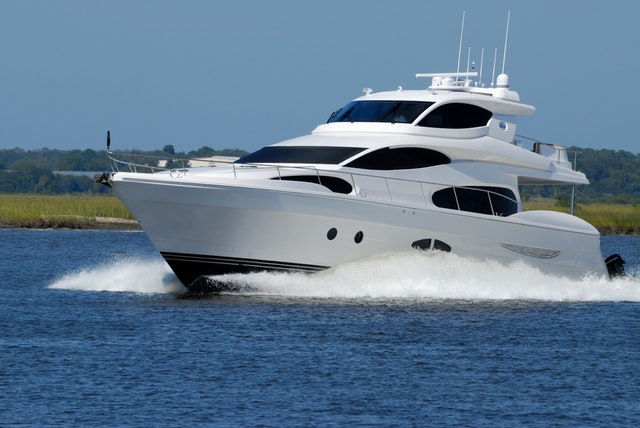
Yachtmaster Offshore Requirements:
In order to be eligible to take the Yachtmaster Offshore practical exam, candidates must meet the minimum sea time requirements.
The RYA Yachtmaster Offshore minimum sea time prerequisites are as follows:
- 50 days at sea on yachts up to 500GT
- 5 days as skipper on vessels less than 24m LOA
- 2500 miles on yachts up to 500GT
- 5 passages over 60 miles long, which must include 2 overnight passages and 2 as skipper
If a candidate already holds an RYA Yachtmaster Offshore Certificate of Competence for a different vessel type (Ie. power or sail) then the above prerequisites are adjusted as indicated on the RYA's Yacht Master Offshore Exam page.
Yachtmaster Offshore Course Breakdown
The Yachtmaster Offshore course consists of a 40-hour (minimum) theory course (excluding exam time), 5 days of practical training and preparation followed by a 2-day practical examination.
Yachtmaster Offshore Theory:
The following topics are covered during the Yachtmaster Offshore theory course:
- Position fixing,
- Course shaping and plotting,
- Tidal knowledge,
- Use of almanacs and admiralty publications,
- Electronic position finding equipment,
- Taking and interpreting forecasts,
- Plotting weather systems,
- Weather predictions using a barometer.
- Certificate issuing criteria
Yachtmaster Offshore Theory Online
The RYA Yachtmaster Offshore Theory can be studied in an online or virtual distance learning format. The online version of the course allows students to work through the training content at their own pace, which may benefit those who are working with little time off.
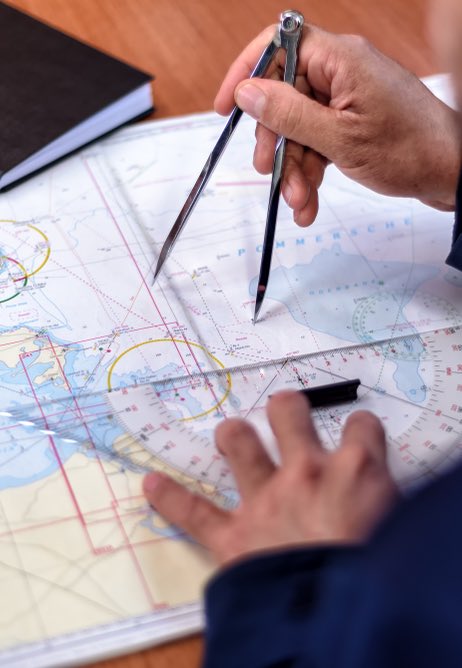
Yachtmaster Offshore Practical
Although there is no formal training course leading up to the RYA Yachtmaster Offshore Practical exam, it is common for yacht crew to complete a practical training course, leading up to the exam. This may vary slightly between schools but should be done at an RYA accredited center.
The exam will include an assessment of your skippering skills, boat handling, general seamanship, navigation, safety awareness and knowledge of the IRPCS, meteorology and signals.
RYA Yachtmaster Offshore Practical Exam:
A valid GMDSS-approved SRC Radio Operators Certificate and a First Aid Certificate are requirements for the RYA Yachtmaster Practical examination. The Elementary First Aid Certificate as acquired during STCW Basic Training is an accepted version. For recreational sailors, an RYA First Aid certificate is sufficient.
In addition to this, candidates need to ensure that they have met the minimum sea time prerequisites as highlighted above.
Practical Exam Assessment:
The exam will include an assessment of:
- The candidate's skills as a captain,
- Boat handling ability
- General seamanship,
- Navigation planning and execution
- Safety awareness and procedures
- Knowledge of the IRPCS,
- Meteorology,
- Lights, shapes, sounds, and other signals.
Practical Exam Duration:
- 8-12 hours for 1 candidate,
- 10-18 hours for 2 candidates.
- No more than two candidates can be examined in 24 hours and no more than four candidates can be examined in one 2-day session.
RYA Yachtmaster Offshore Certificate
Students who pass their Yachtmaster Offshore practical and theory examinations will be awarded an RYA Yachtmaster offshore certificate of competency. It is important to understand that CoC is a recreational license until it is commercially endorsed by the MCA.
RYA Yachtmaster Offshore Commerical Endorsement
In order to commercially endorse your Yachtmaster offshore certificate, you will need to submit the following:
- Original Yachtmaster Offshore certificate
- RYA Professional Practices and Responsibilities certificate
- an RYA commercial endorsement application form
- Your original, completed ML5, ENG1 , or an ENG1 equivalent medical form.
- A copy of your RYA Basic Sea Survival certificate or STCW Personal Survival Techniques
- A copy of your RYA Marine Radio SRC Certificate or other acceptable GMDSS Marine Radio Operator's Certificate .
- A passport-sized photo with your name on the back
- The application fee
RYA Yachtmaster Offshore License
A license card/ book will be provided to those who pass the relevant Yachtmaster offshore examinations. The license will include a photo, and details about the license holder, and will also include information about the endorsements associated with the license.
RYA Yachtmaster Offshore Training School Locations
Brazil Sao Paulo
Croatia Split
Greece Corfu
South Africa Cape Town Langebaan

Spain Barcelona
Turkey Marmaris
United Kingdom England Ireland Scotland
West Indies Antigua
Username or Email Address *
Remember me Lost your password?
Username or Email
Get New Password
- Yachtmaster Offshore (Power or Sail)
- Recreational

Yachtmaster Offshore Training
The IYT Worldwide Yachtmaster Offshore certificate is a recreational certificate of competency to command sailing and/or power vessels up to 24 metres in length up to 150 nm offshore. It is a comprehensive theory and live aboard course consisting of five days classroom theory and a practical component of six days for sail or five days for power including the practical on the water examination. The minimum age to obtain this certification is 18. Candidates must either hold a recognised VHF Radio Operators Certificate or must take the full IYT VHF-SRC Marine Communications course and school must place order for this certificate while placing order for the Yachtmaster Certificate of Competency. If ordering VHF at the same time as Yachtmaster Offshore Certificate please upload a note to this effect. We have provided a sample note to upload when placing order. * Please note that we do not accept ISSA VHF qualifications. (I f you are unsure if your radio license will be accepted, please send a scanned copy of the front and back of your license to [email protected] . We will verify that your license is sufficient to receive the IYT Yachtmaster Offshore license).
The courses are designed to provide the highest standard of maritime education for the recreational yachtsman and woman and for those who are serious about obtaining the best nautical qualifications available. They are ideal for those who greatly want to expand their knowledge and experience and increase their confidence in commanding a yacht. For those who are taking the courses, completion of the five-day STCW Basic Safety training courses is not required but highly recommended. The five-day STCW course covers Firefighting, Sea Survival, First Aid and Personal Safety and Social Responsibilities.
It has come to our attention that it has not been made perfectly clear to all IYT Worldwide yachtmaster candidates that this certification is for recreational use only and may never be upgraded to a professional certificate. Therefore, we require all candidates taking a recreational IYT Worldwide Yachtmaster Coastal, Offshore or Ocean course to complete an acknowledgement prior to taking the course.
It is important to understand that an IYT certificate is a qualification that can be used across the globe. Therefore, unlike other training organisations, IYT insists on an understanding of IALA Regulations in Areas A & B, weather systems in the North & Southern hemispheres, tidal calculations for the Mediterranean and North America and the effects of tropical revolving storms.
Yachtmaster courses are not for beginners. This six-day comprehensive high-level shore based course includes assessment papers and written examinations. Candidates are advised that a considerable amount of private study and varied cruising experience is required in addition to the formal instruction provided.
IYT’s Yachtmaster Offshore Sail Certificate covers command of a sailing vessel with a sail area of greater than 80 square metres/861 square feet. Please see the official statement here .
Certificate Limitations
- Command of a vessel up to 24 meters in length
- up to 150 miles offshore
- not for commercial use
Note: Yachtmaster Offshore is a recreational course that can be taught in any language BUT cannot be upgraded to the professional Master of Yachts certificate.
What are the minimum entry requirements to apply for the IYT Yachtmaster Offshore course?
1. 50 days on board a yacht at sea as an active crew member. A day is defined as a period of 24 consecutive hours. Parts of a day may be included in this total, but a day is not invalidated by a candidate leaving the yacht for a few hours during a cruise. The term “at sea” is defined as being on a vessel outside of any harbour – natural or artificial – in which a cruising yacht could secure or anchor for a prolonged period of time.
2. Have logged 3,000 miles in a yacht while cruising at sea (power or sail). This mileage must be logged on genuine cruises or passages but not short day trips. At least 2,000 miles must have been completed on coastal voyages and not ocean crossings. It is important that the candidate has considerable time of actual vessel handling.
3. Thirty hours on watch at night underway as an active member of a yacht’s crew. For at least six hours of this night time experience, the candidate must have been acting as the vessel’s captain/watchleader. “Night,” in this context, is defined as the time between sunset and sunrise.
4. A current medical examination and a colour blindness eyesight examination, which allows the participant to safely perform the relevant duties on a yacht, including being able to see and distinguish lights and signals of other vessels and navigational marks in typical weather conditions without risk to him/herself, other crewmembers or the safe operation of the vessel.
5. A six-hour VHF Radio Operators course covering the general rules and procedures for the safe operation of a VHF marine radio. If you do not have a valid VHF certificate this course may be conducted on board the yacht or in the classroom prior to joining the practical course.
Minimum sea time must have been met prior to the final examination.
What does the exam consist of?
Written theory examinations will occur during the course. The final examination is an oral and practical test on board a yacht. Candidates must demonstrate that they have sufficient ability to handle, dock, and anchor the boat with a required level of confidence. Candidates can expect to be examined on any subject contained within the syllabus and to be questioned on any of their yachting experience to date.
In the event that the examiner considers an examinee not to have achieved the required standards, a certificate will not be issued. In this case, a confidential report will be sent to the candidate outlining the reason or reasons for failure and suggesting remedial action that could lead to the successful completion of the course. Completion of the IYT Worldwide Yachtmaster Offshore course is not a guarantee of passing the examination and receiving your certificate.
How do I apply for enrolment?
Candidates may apply to any of the participating IYT Worldwide Partner Schools worldwide who offer this course. In order to apply for the IYT Worldwide Yachtmaster certification courses, a detailed yachting resume must be sent to your IYT training school for evaluation.
Candidates may sit the shore-based course prior to having all the above requirements.
Verification of the above yachting experience must be original and signed by the skipper of the yacht in which the candidate was sailing. Candidates claiming sea time during times when they were acting as skipper may sign their own entries but independent verification may be required and checked by IYT Worldwide.
What is required for my final Yachtmaster examination?
All of the courses and criteria must be fulfilled before a candidate may apply to take the final on-board examination.
What does the final exam consist of?
The final exam will be conducted by an IYT Worldwide Yachtmaster examiner and takes the form of an extensive oral and practical test on a yacht (either power or sail). Candidates can expect to be examined on any subject covered by the syllabus of the shore based or practical courses and to be questioned on any aspect of their yachting experience to date.
In the event that the examiner considers an examinee not to have achieved the required standards and/or the candidates ability as Captain does not reach the required standard, and/or the prerequisites have not been met for the IYT WorldwideYachtmaster Offshore, a Yachtmaster Coastal certificate may be issued in the interim. In this case, and if requested, a personal report will be sent to the candidate outlining the reason or reasons for failure and suggesting remedial action prior to re sitting the exam.
Completion of the Yachtmaster Offshore certification course is not a guarantee of passing the examination and receiving your certificate.
As you advance and become more proficient as crew or skipper you take on bigger challenges that require proper training to ensure the safety of your family and friends. The bigger the boat or length of adventure the more training you require.
Most of us prefer to spend our time on the water and not in a classroom. To facilitate this, IYT has a series of E-learning courses available for the theoretical part of sail and powerboat training.
- Take one of our online (Elearning) courses for your next level of training.
- Plan your practical training at one of our many schools worldwide to earn your final qualification.
- Book in advance with your school as class sizes and availability may be limited.
- Review the IYT course progression details to learn about professional level courses.
- Spend time on the water and properly log your seatime.
The Boating Lifestyle is one of the most rewarding pursuits available. There is something physically and emotionally invigorating when you are offshore. To enjoy the experience fully you need the proper training & skills to be safe, prepared and command a vessel.
Recreational Student Information
Benefits of an iyt certification.
IYT is the largest provider of crew and skipper certificates for the recreational yachting industry in the world. Learn more about the benefits of an IYT Certificate.
Certificate Renewal
For many IYT certificates, there is the need to re-qualify for your certificate every 3 to 5 years. This ensures that our certifications are meeting international standards.
IYT Yachting Passport
The IYT Passport is recognized in over 40 countries around the world and offers you an opportunity to study and train worldwide.
- Course Progression
A beginner at sailing or operating a powerboat should be familiar with the training path that is available from IYT. Many recreational boaters progress to become crew on superyachts.
- Privacy Policy & Terms Of Use
- Become a Partner School
- Register with IYT
- Find a School
- IYT E-Learning
- Certificate Renewal & Replacement
- Get Certified
- Recreational Training Course Progression
- IYT Passport
- Crossover Opportunities
- Course Progression Interior
- Dive Boat Training
- Forms And Docs
- Instructor Training
- Personal Watercraft Operator
- Dinghy Sailing Programme
- IYT Try Sailing
- IYT Introductory Sailing Skills
- IYT Day Skipper / Crew Sail
- International Crew
- International Flotilla Skipper
- International Bareboat Skipper
- International Flotilla Skipper Sail – Catamaran
- International Bareboat Skipper Sail – Catamaran
- International Certificate of Competency (ICC Certificate)
- Powerboat Skipper
- Yachtmaster Coastal (Power or Sail)
- Yachtmaster Coastal Sail – Catamaran
- Yachtmaster Offshore Sail – Catamaran
- Yachtmaster Ocean
- Patron de Yates (Yachtmaster Coastal Spanish edition)
- Marine Communications (VHF-SRC)
- Small Powerboat and Rib Master (MCA Recognised)
- IYT Commercial Tender License Course
- Weather Master
- Navigation Master
- Master of Yachts Coastal/Mate 200 Tons (Power or Sail)
- Master of Yachts Limited (Power or Sail)
- Master of Yachts Unlimited
- Superyacht Chef
- Superyacht Deck Crew Course
- Superyacht Hospitality Training
- Boat Engineer Course (SCV Code for Vessels Operating in the Caribbean)
- IYT-MSWI BoatMaster Course
- Become An IYT School
- Upgrade Your School
- Find A School
- Course Levels
- Instructor Qualifications
- Vessel Requirements
- Vessel and Facility Requirements
- Unauthorised Schools and Other Entities
- Shipping & Delivery
- Government Approvals
Yachting Monthly
- Digital edition
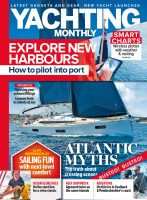
How to pass your Yachtmaster exam
- Chris Beeson
- September 16, 2015
The global standard of sailing qualifications is achievable for any experienced, competent skipper. Tom Cunliffe explains how to pass your Yachtmaster exam
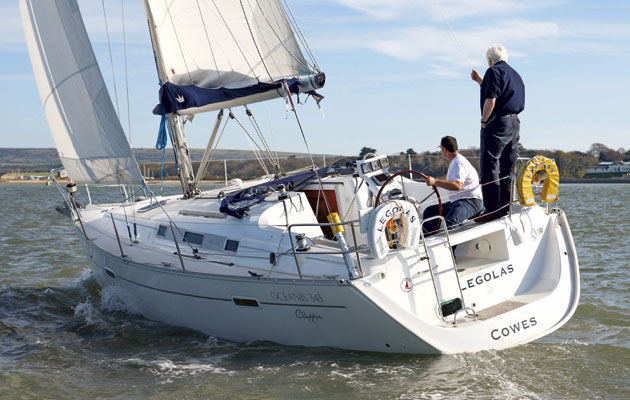
The only certificates accepted by the authorities are those issued after an at-sea examination. To become a fully-fledged Yachtmaster, the practical test is the only one that counts Credit: Graham Snook/YM

Tom Cunliffe is an RYA Yachtmaster examiner. He has passed and failed hundreds of Yachtmaster candidates over the years
We in the UK are exceedingly fortunate. Just as the English language is the best bet for a world traveller, our very own RYA/MCA Yachtmaster qualification happens to be the global standard for sailing. It’s required for anyone planning to become a professional and, thanks to the continuing efforts of the RYA, Brits who sail for leisure still don’t have to carry any proof of competence in home waters. Despite this blessed lack of regulation, the Yachtmaster certificate remains the logical target of many a self-motivated sailor. It also represents the icing on the cake for those looking for the reassurance of an external assessment.
Courses and exams
Yachtmaster training can take place on a boat or in a classroom. A shore-based course, either at desks in a school or via the increasingly popular Internet distance learning programmes, ends with a Yachtmaster theory exam. Success in this will help a student in subsequent qualification upgrades, but it is not officially recognised. The only certificates accepted by the authorities are those issued after an at-sea examination – the Yachtmaster Practical . To become a fully-fledged Yachtmaster, this practical test is the one that really counts.
Yachtmaster Prep

Meteorology matters: a favourite with examiners is to produce a weather map and invite you to analyse it. Be ready and know your subject
This is a non-RYA course and, as such, has no official status or syllabus. However, it is run successfully by many RYA sailing schools to prepare candidates for an examination which generally follows on at the end. Up to four students spend several days together on the boat in which they will be examined. The benefits are that they get to know one another and their yacht under the guidance of a highly qualified Yachtmaster Instructor. The general feeling is that these tutors can’t teach you much you don’t already know in a week, but that they are very good at coaching the best out of those skills you already have. Prep courses are great for brushing up on how to jump through the various hoops an examiner may set up. What they can’t do is make someone who doesn’t have suitably constructive mileage into the confident skipper examiners are looking for.
Coastal or Offshore – what’s my level?
Recently, the old Coastal Skipper ticket has been superseded by the new ‘Yachtmaster Coastal’ certificate. The qualifying mileage for this MCA-recognised qualification is 800, with passage and night-hour requirements being relaxed in comparison with ‘Yachtmaster Offshore’, which keeps its 2,500-mile entry level. Either is a proper Yachtmaster qualification and can be described as such. Only the often-dropped suffix distinguishes the two. The syllabi are identical, the variant is the rigour of the examination. Apply for ‘coastal’ and the examiner, recognising that you have less sea-time, will be more inclined to cut you a bit of slack.
The RYA has noted that most candidates are really only making ‘coastal-status’ passages. In real terms, this includes an annual trip across the Irish Sea, the North Sea or the Channel in a calculated weather window, which is very different from setting off from Ramsgate towards Norway with five days and potentially serious conditions ahead of you. The implications should be clear: unless you need the Offshore ticket for professional reasons, if in doubt, go for Coastal.
Preparing yourself and the boat
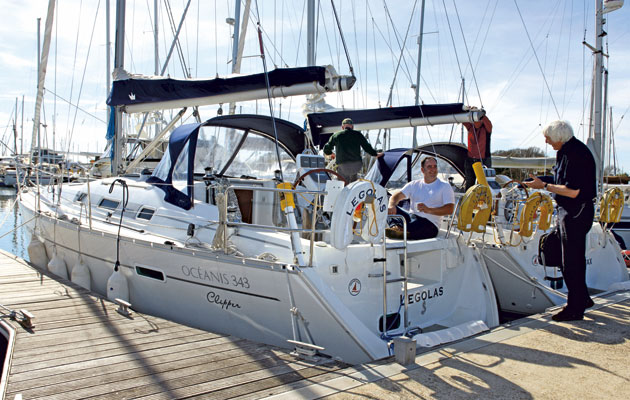
A relaxed candidate with a mug of tea makes a better impression than a harassed-looking one
If you’ve signed on with a sailing school, you’ll be stuck with the boat you’re given. You can be confident that this yacht ticks all the official boxes by being coded for commercial use, but while some are very up-together, others are not. If the boat is generally sloppy and scruffy, you can at least make an effort to stow the mainsheet in a seamanlike manner while you are nominally skipper.

Neatly coiled lines reflect well on the skipper
You can also ensure that fenders are hung at the same level, sharpen up the guardrails and see that things generally look as though somebody knows the difference and cares. Then the examiner won’t hold the ratty lifebuoys and the smelly bilge against you.

Mind that your dress and demeanour don’t make a bad first impression
Try to be ready in good time so that you aren’t involved in a last-minute kerfuffle. If you’re relaxing in the cockpit with a mug of tea when the examiner arrives, he or she will be more impressed than if you’re frantically working out tidal heights and scuffling through the chart table. Wear sensible kit. Don’t worry if it’s not this season’s fashion. My examiner turned up in an old duffel coat back in 1978 and I think I was wearing a canvas smock and a flat cap, but the smock was freshly laundered and the cap was right way round…
The main thing is that you can sail, but an examiner is always pleased to be freed of any hassle with the paperwork. Most of us are no better with admin than you are, so make our lives easy by producing an up-to-date first aid ticket and all the rest, plus a cheque made out to the RYA – not the examiner, perish the thought!
Passage planning

Your passage plan should be realistic. Keep it simple and be ready to adapt and update as things develop
You may be given the opportunity to produce a passage plan before the examiner arrives. If so, make it realistic. Don’t plot every course to the last degree. After all, you don’t know what speed you’ll make or what the wind will really do. Check tidal gates, distances, viable alternatives and the weather. Look at any hazards, sort out a time to leave and have a plan for updating as things develop. That’s about what you’d do if there were no exam, and that’s what I, at least, want to see.
Examination on your own boat
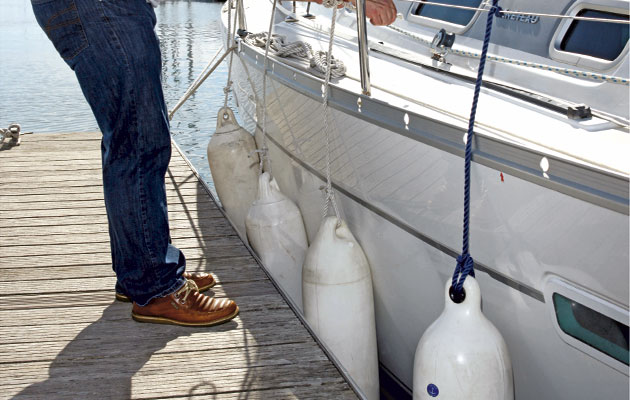
A nicely level line of fenders sends a good signal to the examiner
You don’t have to go to a sailing school to be a Yachtmaster. I love it when a candidate asks to be examined without training on his own boat. Don’t worry if she isn’t coded. There’s no legal requirement that she should be. Most of mine haven’t been either, and I couldn’t care less.
As an examiner, I want to see that your priorities are sound and that you’re thinking clearly and for yourself. On the day, the yacht must be clean, tidy and seamanlike. Waterline crisp, sail covers Bristol fashion, not looking like some poor bird with a broken wing, ropes carefully stowed, a comprehensive chart kit for the waters to be sailed, the makings of a meal plus snacks and, of course, everything that counts should be working.
What the examiner is looking for
Feeling relaxed in close quarters

Competent, confident boathandling counts well in your favour
If there’s one thing that will upset an examiner, it isn’t that you forgot to put on your lifejacket, it’s that he feels insecure when you begin manoeuvring in a marina. Take it from me, there’s nothing worse than sitting at the backstay wondering what you’re going to hit. If the boat slides sweetly out of her berth with everyone knowing what’s required and no shouting, then moves away easily with the examiner confident you’re in charge, that you’ve checked the next alleyway for collision risk, that your choice of speed is sensible and efficient and that it never enters his head to feel anxious, you’re well on the way to a pass after five minutes. No course can teach you this. It can only tick the box confirming you’ve managed it once or twice. The rest is up to you and your sea time.
Wind awareness
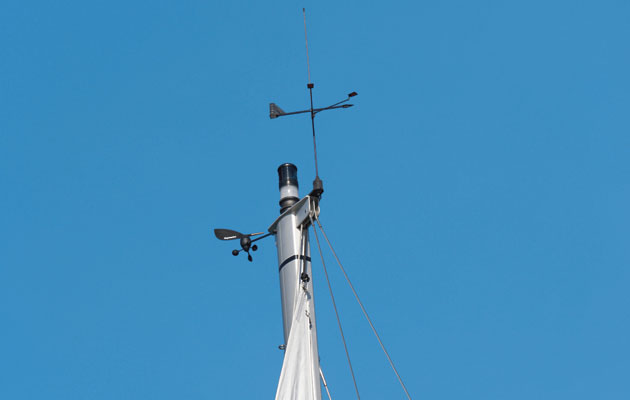
You should always be aware of the true wind direction and how it will influence any manoeuvres
Here’s another subject you can’t learn on a prep course. Knowing where the wind is and how it relates your position to any impending manoeuvres is critical. I often ask a candidate where the wind is coming from when he’s approaching a situation we both know will involve some sort of gyration under sail. If he looks instinctively at the masthead or, worse still, an instrument set to apparent wind, he’s dropped a bagful of points. At this stage, his mind should be setting up where the boat will best be placed to make her critical turns. Apparent wind isn’t going to help him much. What he should be doing is glancing at the water and noting the tiny ripples to assess what the true wind is actually doing. I’m often amazed at how many folk have never been shown how to do this. Racing sailors can handle it in their sleep, because they need to predict windshifts, but cruisers tend to get lazy, so make sure you can read the wind.
Good sailing
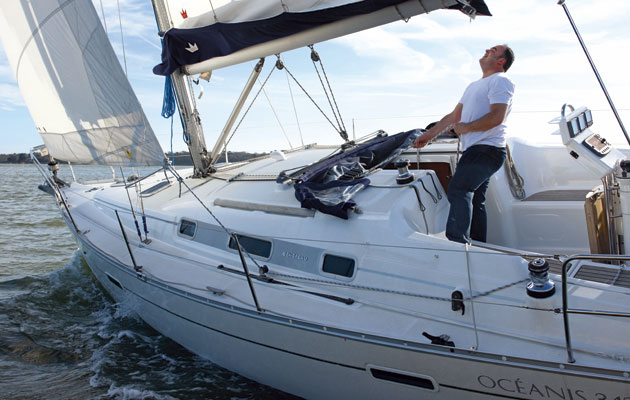
No need for incessant, race-style tweaking, but pay due attention to sail trim while the yacht is under way. If there’s a mainsheet traveller, use it
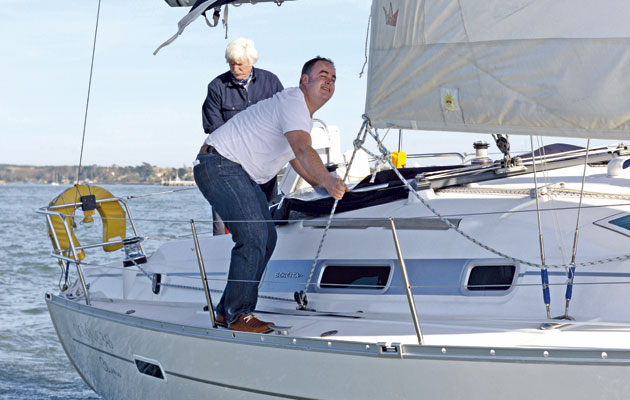
Ensure that the genoa sheet leads are properly positioned for the point of sail you’re on

Lovely: both mainsail and genoa set up with the right amounts of tension and twist
All examiners hate to see a yacht sloppily sailed on passage. Make sure that your crew are using the traveller, that genoa fairleads are properly positioned, that the main is well set up with kicker and mainsheet tension for twist. Above all, do not sail over-sheeted. It’s a dead giveaway that you just haven’t been out there enough yet.
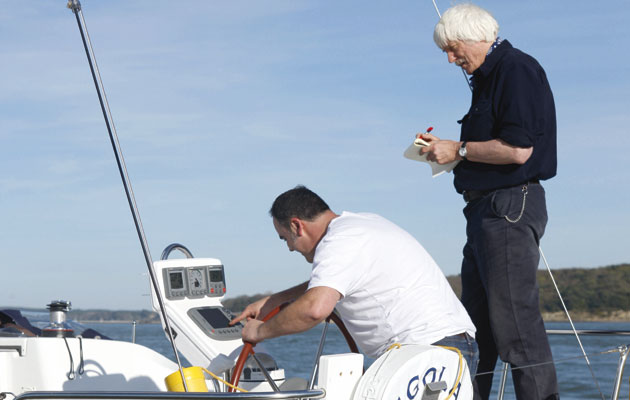
Too much staring at the plotter screen betrays nervousness
In the days before GPS set navigators free, people used to fail exams by what we called ‘sailing the chart table’ rather than skippering the yacht. Assuming the test to be all about some sort of imagined ‘correct navigational practice’, candidates nailed themselves to the navigatorium when they should have been up on deck directing operations and watching out for the ship coming up astern that was suddenly looking bigger every moment. Well, guess what? Nothing has changed. This remains a big problem with neophyte Yachtmasters.
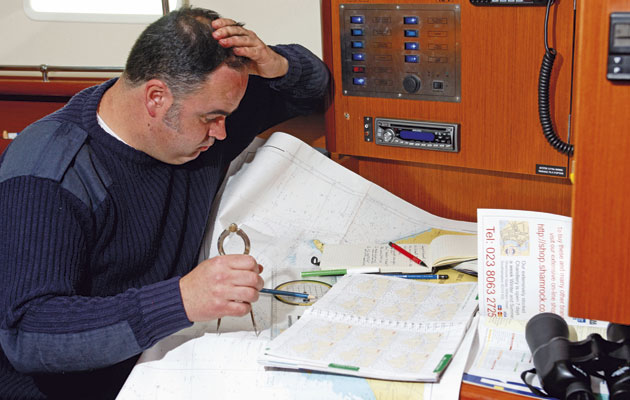
Sail the boat, not the chart table
The secret is to plan well, then nip below every so often on passage to keep an eye on what’s going on in the chart department and whizz back on deck pronto to carry on skippering the boat. I’ll lay a pound to a penny it’s what you do when there’s no examiner on board, so have the confidence to back your own usual practices. This is particularly important at night in crowded waters. An unsuccessful candidate often fails himself by allowing disorientation to creep in, simply by not keeping the true perspective on events, which can only be found on deck.
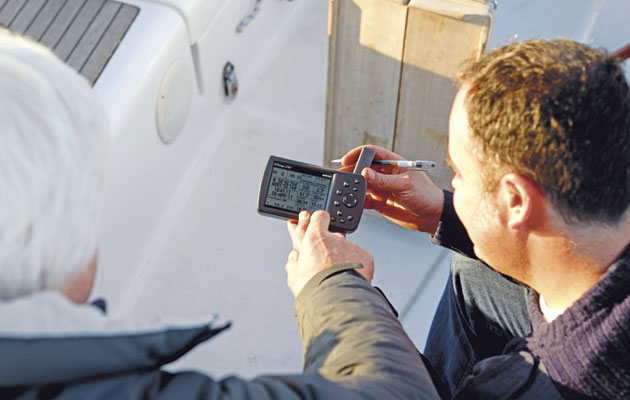
The use of electronic nav-aids such as GPS is not ‘cheating’ – it’s an integral part of navigation
All examiners have their own take on use of electronics. Personally, I want to know my candidate is making modern aids to navigation, including a chart plotter if there one, an integral part of his navigational policy. The idea, as one candidate suggested, that use of GPS is somehow ‘cheating’ is incomprehensible to me. I will almost certainly ask at some stage that the yacht be navigated classically, to see how easy my man is with what, for most people, are now backup skills. If I’m unconvinced by his performance, off he goes to think again.
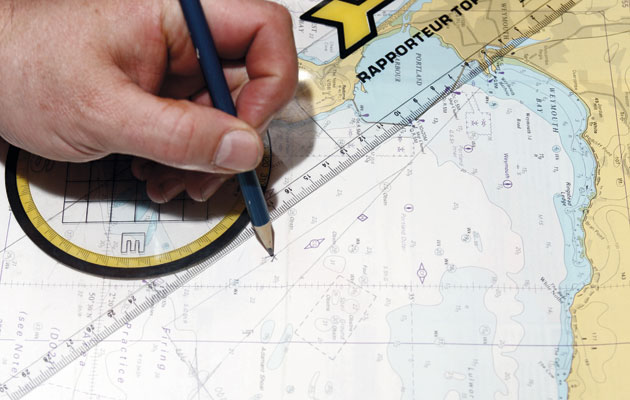
Your chartwork should be fluid and accurate
Skilled chartwork comes with use, and no amount of last-minute swotting can make up for weeks of doing it as a matter of course. Plotting traditional fixes is a good giveaway these days. With GPS all around us, we only do this for real when electronics fail. I’ve seen a person take 15 minutes to select three objects from a background studded with lights, then plot the results. The yacht had moved over two miles in the meantime…

It’s absolutely vital that you maintain a decent logbook during the exam
It’s absolutely vital, whether navigating with a giant chart plotter or a Walker log, that you maintain a decent log book. Without this, if GPS fails for any reason at all, you’re lost, Mate, so is your exam, and quite right too!
Take command
One of the most important questions on most examiners’ private lists is how good the candidate is at taking charge. If he’s managing well, we probably won’t even notice that he’s in command, that his crew all know what’s expected of them and that their skipper is quietly checking that they’re doing it. Good leadership is seldom about barking orders, and never about ignoring all on board, yet leadership is what being a Yachtmaster is all about. First, you must be sufficiently comfortable with your own skill levels not to have to worry about little things like picking up a mooring. Only then can you consider what may go wrong for the poor soul on the foredeck in a gale at midnight.
The classic skills
These are what most people imagine success in an exam is based upon. Actually, these basic skills merely help an examiner build up an overall picture of the candidate. It’s generally not a hanging matter if one manoeuvre goes a bit haywire. Even a grounding is often more interesting for what the candidate does about it than for the fact that it has happened. After all, nobody is perfect, especially under the stress of an exam.
Man overboard
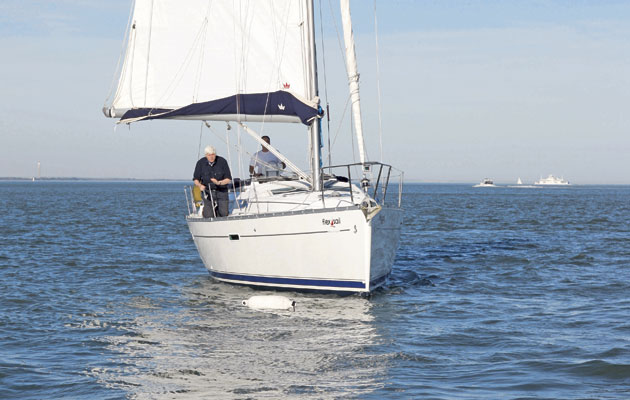
An effective, confidently executed man overboard drill speaks volumes about a candidate’s boat-handling ability but it’s not necessarily curtains if the manoeuvre goes a bit haywire
Errors in principle are not popular with examiners. Mistakes under pressure may sometimes be forgiven, and man overboard is a case in point. If the boat sails past the dummy with her mainsail full and the examiner asks, ‘What went wrong?’ It won’t get you much of a score if you reply, ‘I was going too fast.’
‘Candidate’s speciality, stating the bleeding obvious,’ the examiner will note on his pad, and move on, downhearted.
However, if you say, ‘I’m kicking myself because I was too far upwind and couldn’t de-power the main. I tried to get onto a close reach but I misjudged my approach,’ he’s more likely to take a lenient view – especially if you’ve opted for ‘Coastal’.
Securing the yacht alongside
When I was examining instructors regularly, I’d often sail up to Poole Quay (a tidal wall) shortly before closing time. I’d hop off the boat as soon as she touched the piling, saying, ‘You sort her out, skipper, I’m off for a quick pint.’ I’d then do just that. When I returned 10 minutes later, if the yacht was neatly snugged down with four lines ashore, ends on the dock, a fender board in place, sails neatly stowed and all hands below cooking and relaxing, the guy was in good shape for a pass. If I found discussions on deck about whether to ‘hand the end back for a spring’, and people blundering about in the dark, things didn’t look so bright for our hero. Have a system and know how to execute it.
… and don’t forget
Mooring and anchoring

Mooring and anchoring under sail should present no challenge to the aspiring Yachtmaster. When in doubt, drop the mainsail
These are Day Skipper skills that should pose no threat to a Yachtmaster candidate. Under sail, just remember first to assess whether the wind is with or against the tide. If you get lucky and it’s against, drop the main and arrive stemming the stream, spilling under headsail or creeping along under bare poles. If wind and tide are at all ambiguous, never forget the old adage – when in doubt, drop the mainsail.
Meteorology
As forecasting has become more comprehensive and accessible, I’ve noticed a reduction in candidates’ capacity to understand what’s going on and to read a bulletin creatively. Anyone who can’t describe the typical cloud sequence on a North Atlantic depression gets nil points from me, and failure to understand the basics of air masses is going to run up a black mark too. A favourite with examiners is to produce a weather map and invite their Yachtmaster to analyse it. Be ready, and know your subject.

Tom sees no reason not to have a chart in the cockpit, but some examiners disapprove of it. Be ready to justify your choice
Many candidates produce excellent pilotage plans for entering a strange harbour. I’m happy with that, and most examiners love it. Personally, I prefer to sketch a few notes on the actual chart and have it in the cockpit held down with a winch handle, yet I’ve met examiners who’d be horrified to see a chart on deck at all. So there you have it. Do what suits you best, then be ready to justify your choice. Actually, this advice is good across the board. The examiner wants to see what you really do, not some fantasy you’ve cooked up because you think he might like it. That is a weak candidate’s policy and it often backfires.

No shortcuts here, you just need to know your stuff – and finding the time to learn isn’t difficult
So far as the MCA is concerned, this is the crunch. Examiners are encouraged to demand high standards in this subject, and there’s no reason for a candidate, knowing full well he is to be put on the griddle, not to have the regulations burned into his heart. The best way to be exam-proof is to invest in A Seaman’s Guide to the Rule of the Road, available for modest money from all good chandlers or Bookharbour.com. Place it prominently in the heads some months before the exam and devote five minutes of the shining hour each day to digesting its wondrous contents. The book makes it easy and there’s no excuse for disappointing the Board of Trade!
For all the latest from the sailing world, follow our social media channels Facebook, Twitter and Instagram .
Have you thought about taking out a subscription to Yachting Monthly magazine?
Subscriptions are available in both print and digital editions through our official online shop Magazines Direct and all postage and delivery costs are included.
- Yachting Monthly is packed with all the information you need to help you get the most from your time on the water.
- Take your seamanship to the next level with tips, advice and skills from our expert skippers and sailors
- Impartial in-depth reviews of the latest yachts and equipment will ensure you buy the best whatever your budget
- If you are looking to cruise away with friends Yachting Monthly will give you plenty of ideas of where to sail and anchor

- Mail: [email protected]
- Call Us: +44 (0) 23 8045 8737
RYA Yachtmaster Scheme MCA Examinations / Certificates of Competence
Introduction
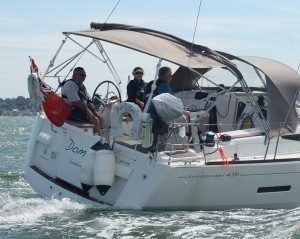
These sailing qualifications are recognised around the world as a clear mark of your sailing ability. Unlike a Day Skipper or Coastal Skippers Certificate there is no RYA Course or Syllabus to follow. Simply they are a test of your sailing ability conducted by an examiner, authorised to do so by the RYA.
Sailing Schools offer a preparation course running straight into the exam both of which normally run over a period of 7 days. It should be noted that these course are designed for you to brush up on some specific skills and areas of the exam that you will be tested on and not teach you how to sail. So you should have all the necessary experience prior to joining the course and be a confident sailor.
For some, Yachtmaster exams are taken just for a sense of achievement and offer a way of improving your sailing knowledge and techniques. For others wishing to embark on a career in the marine industry they are essential qualifications to achieve.
In this article we take a look at
- The RYA Yachtmaster Scheme
- Benefits of taking a 5 Day Preparation Course
Pre Exam Requirements
- Exam duration
- Converting between Sail & Power
- Working Commercially
Qualifications within the RYA Yachtmaster Scheme
Yachtmaster Coastal
Yachtmaster Offshore
Yachtmaster Ocean
Definitions
RYA Yachtmaster Coastal Skipper : Not to be confused with the Coastal Skipper course completion certificate, the Yachtmaster Coastal is the first of the Yachtmaster Scheme qualifications.
At this level you are deemed to have the knowledge needed to skipper a yacht on coastal cruises but not necessarily the experience needed to undertake longer passages.
During the exam you will be set tasks to demonstrate your ability to skipper a yacht and may be asked questions on all aspects of the RYA Cruising Scheme from Competent Crew to Coastal Skipper.
RYA Yachtmaster Offshore : The most widely recognised qualification and anyone holding this certificate is deemed to be competent to skipper a cruising yacht on longer passages but not more than 150 nm from harbour.
The examiner will be set tasks to test your ability as skipper of an offshore cruising yacht and you will be asked questions on any part of the syllabus for all courses except the Yachtmaster Ocean.
RYA Yachtmaster Ocean : Considered as the pinnacle within the sailing world and commonly taken by those seeking a career in the marine industry. You have sufficient experience to skipper a yacht on passages of any length in all parts of the world.
The exam consists of a written and oral test of your knowledge of ocean passage making including planning, navigation, worldwide meteorology, crew management, yacht preparation, maintenance and repairs. You will also be questioned on your sights taken at sea during an ocean passage.
RYA Yachtmaster Scheme
Certificates awarded within the RYA Cruising Scheme, such as the Day Skipper or Coastal Skipper are awarded by your instructor at the end of your course on the basis of continual assessment assuming you can demonstrate your abilities for the level you are at. There is a set syllabus and the courses are intended to teach you how to sail as well as improve your sailing skills.
MCA/RYA Certificates of Competence are awarded after a short practical assessment by independent examiners. They are designed to test your ability to skipper a yacht and are some of the most widely recognised and credible yachting qualifications available.
The RYA oversees the Yachtmaster Scheme on behalf of the MCA. Carefully chosen Yachtmaster examiners will assess both your sailing and skippering abilities.
Whilst Sailing Schools run a 5-day preparation course in advance of your examination aimed to bring you up to speed and prepare you for your exam. It is assumed that you already have the knowledge and the sailing skills required for the level you are being examined for.
Just like the RYA Cruising Scheme, you can join the Yachtmaster Scheme at any stage. You do not need to have completed any of the shore-based courses and nor do you need to complete a preparation course before taking your exam.
So if you are confident enough and sufficiently well prepared you can simply book an examiner through the RYA and take the test on your own yacht or one that you have chartered in.
However, most people appreciate that by taking a 5-day preparation course in advance of your exam will significantly increase your chances of passing.
Reasons for taking a Yachtmaster Prep Course
The whole purpose of a Yachtmaster Prep course is to prepare you for your exam and be challenged by an instructor who understands what an examiner is looking for. To find areas where you are weakest and allow you the opportunity to practice and develop your skills.
It is an advanced and intensive course and certainly no holiday and whilst you may be an experienced yachts person it is not often that you will practice the following
- Advanced skippering techniques
- Close quarter berthing in various and challenging conditions of wind and tide
- Picking up a buoy under sail
- Weighing or lowering anchor under sail
- Boat handling in confined areas under sail
- Man overboard recovery techniques
- Advanced Navigation
- Blind Navigation
The course is largely a practical course and designed to hone your sailing and boat handling skills. Whilst you will cover certain areas of theoretical knowledge it is important that you are fully up to speed with regards to the following before attending the course.
- International Regulations for Preventing Collisions at Sea
- Meteorology
By attending a course you will undoubtedly learn a new set of skills and it will importantly get you into the mindset so that you are fully prepared to take the exam.
Format of the Course & What to Expect
Courses run for 5 days starting on a Friday evening. The exam follows immediately after the course and can run for up to 48 hours depending on the level and number of candidates.
We restrict the number of students down to a maximum of 4 persons to give everyone as much practical hands-on time as possible. The courses are run on board one of our 36 – 39-foot sailing yachts which are based in Mercury Yacht Harbour on the River Hamble. The courses are run within the Solent where you can practice navigation, pilotage and boat handling in a whole different range of different tidal and weather conditions. Ultimately there is little benefit in sailing in a straight line so it is highly unlikely you will venture out of the Solent opting to focus more on the entering and exiting as many ports as possible.
The first evening is all about getting to know the other students and your skipper. It is unlikely that you will leave the marina that night but you will cover certain safety briefings so as to maximise the available time the following day.
During the next 5 days, you will hop from port to port within the Solent. You will live onboard for the full five days, each of you will take it in turns to be the skipper of the day and take responsibility for the crew and general running of the yacht.
Whilst there is no set syllabus to follow there are certain standard areas that the instructor will cover in order to prepare you for the exam. The rest of the course, however, is up to you and everyone else on board to determine based on areas of weakness and what needs to be practised.
You will focus on areas of boat and sail handling and be encouraged to push yourself outside of your comfort zone so as to build up your confidence prior to the exam.
We aim to end the course mid-afternoon on Wednesday so that you have some downtime to relax and calm any nerves prior to the examiner joining on Wednesday evening.
Format & Nature of the Exam
If you are booking a Yachtmaster Preparation course through a Sailing School then the School will arrange an examiner for you.
You will be required to prepare a passage plan for a fictitious sailing trip in advance of the examiner joining the yacht. You will be asked to do this under exam conditions and without the assistance of your instructor or other students. The examiner will give your instructor basic details of a trip from which you will need to create a detailed passage plan. This will get collected by your examiner at the beginning of your exam and be expected to answer questions on the reasoning of your passage plan during the course of your exam !!
It is highly likely that your examiner will want to set off straight away in order to carry out part of the assessment which will take place at night, so be prepared !! The examiner will nominate one person, in turn, to act as skipper and to take responsibility for the yacht. And whilst the obvious pressure will be on this person, at the same time the examiner will be quizzing and watching everyone else to see how you all behave and interact onboard.
You will moor up or anchor somewhere for a few hours overnight before continuing with the assessment the next day. But don’t forget that you are being continually assessed so stay on your guard at all times.
Whilst this is naturally a pressured environment the examiner is there to find out what you know and ultimately wants you to pass. They will do all they can to relax and encourage you to demonstrate that you have the right abilities to pass, so relax and try to act as normally as you can.
Depending on the number of candidates the exam can take anything up to 48 hours. At the end of the exam, you will be told immediately whether you have been successful or not.
Exam Fees are normally payable directly to the examiner and in addition to the course fee charged by the sailing school.
Yachtmaster Offshore Exam Fee – £210 Yachtmaster Coastal Exam Fee – £181
Min Age… 17 years
Sea time…
- 800 miles logged within 10 years of the exam
- 30 days living onboard
- 2 Days as Skipper
- 12 Night Hours
Certificates…
- Radio Operators Licence
- Valid First Aid Certificate
For holders of the Coastal Skipper Practical Course Completion Certificate the sea time is reduced to
- 20 days living onboard
- 12 night hours
- 2 days as skipper
Half the qualifying miles must have conducted in tidal waters
Min Age… 18 years
- 2,500 miles logged within 10 years of the exam
- 50 days living onboard
5 Passages over 60 miles
- 2 of these passages as Skipper
2 of these passages having involved sailing overnight 5 Days experience as skipper
All candidates must
Hold a RYA/MCA Yachtmaster Offshore Certificate of Competence
Have completed, as skipper or mate of a yacht a qualifying passage which meets the following criteria
a) Candidate fully involved in the planning of the passage, including selection of the route, the navigation plan, checking the material condition of the yacht and her equipment, storing with spare gear, water and victuals and organising the watch keeping routine.
b) During the passage a minimum join stop distance of 600 miles must have been run by the log, the yacht must have been at sea continuously for at least 96 hours and the yacht must have been more than 50 miles from land while sailing a distance of at least 200 miles.
c) Hold First Aid qualification as for Yachtmaster Offshore
Exam Duration
The exam will take about 6 to 10 hours for one candidate and 8 – 14 hours for two.
The exam will take about 8 to 12 hours for one candidate and 10 – 18 hours for two.
The exam consists of a written and oral test.
Own Boat Exams
As well as saving money, if you own your own boat then it is logical that you would prefer to be examined on a yacht that is familiar to you.
There are a few requirements
- Not less than 7 meters
- Sound & Seaworthy Condition
- Equipped to standards set out in the RYA book Cruising Yacht Safety C8
- Up to date charts and navigational publications
- Efficiently crewed as the examiner will not take part in the management of the yacht during the exam
To book an exam simply contact the RYA.
Converting between Sail and Power
Holders of a Yachtmaster Coastal or Yachtmaster Offshore certificate may take a conversion exam from sail to power or power to sail. Please note that the exam for converting from power to sail may take slightly longer.
The exam will take about 3 hours and you may be asked on any aspects of the syllabus but will concentrate on those section which are notably different between sailing vessels and power boats.
Mileage must be in the type of vessel you are converting to and must be within 10 years prior to the exam. Half of the qualifying sea time must have been conducted in tidal waters.
Yachtmaster Coastal Conversion Exams
- Minimum 400 miles
- 12 Days living onboard
Yachtmaster Offshore Conversion Exams
- Minimum 1250 miles
- 25 Days living onboard
- 3 Days as Skipper
- 3 Passages over 60 miles including 1 overnight and 1 as Skipper
Commercial Endorsements
If you are planning on working commercially then the use of Yachtmaster Coastal, Yachtmaster Offshore and Yachtmaster Ocean certificates is permitted for the skippers of these vessels provided that the certificates are commercially endorsed. Commercial endorsements are valid for 5 years.
How to obtain a Commercial Endorsement
You will need to send your Yachtmasters Certificate to the RYA with the following
- Medical Fitness Certificate – Link to Medical Fitness Form
- Attend a sea survival course
STCW Endorsements
Standard of Training and Certification of Watchkeepers
For larger vessels and for certain administrations you may be required to hold an STCW 95 endorsement. It is commonly required if you are working outside of the UK on non UK flagged vessels.
You will be required to attend 4 courses
- STCW Personal Survival techniques
- STCW Personal Safety and Social Responsibilities
- STCW Elementary First Aid
- STCW Fire Fighting and Fire Prevention
Renewing your STCW Endorsement can be achieved by sending the following to the RYA
- A covering letter requesting the STCW endorsement
- Your original Certificate
- New Passport Photograph
- Evidence of completion of the STCW course
- Fee payable to the RYA
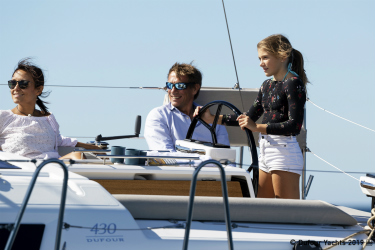
Universal Yachting Ltd
- Terms & Conditions
- Privacy Policy
- DATA REQUEST
- Dufour Yachts
- Boats For Sale
- Yacht Charter
- Marine Services

Universal Yachting Ltd: Mercury Yacht Harbour, Satchell Lane, Hamble, Southampton, Hampshire SO31 4HQ
Call Us: +44 (0) 2380 458737 Mail: [email protected]

Got a Question?
Complete our short form for a prompt response and world class tax advice.
Yes please contact me regarding mortgages
By selecting this, you agree to the Privacy Policy .
Sign in to your account
What is an rya yachtmaster offshore exam.

The RYA Yachtmaster Certificate of Competence is a much sought after qualification for skippers.
This qualification is respected worldwide.
One will be able to acquire the RYA Yachtmaster Certificate if they are able to demonstrate that they have sufficient sea-time, experience and certification in order to sit for an exam.
There are also courses that can help one to be properly prepared for the exam.
Sea Time Experience
Course duration, course content, converting from offshore sail to offshore power, qualifying passages, all my sea time was on superyachts over 24m - is that ok, how to log miles for your rya yachtmaster exam, do i need any first aid qualifications, what about commercial endorsement, stcw basic safety training endorsement, is rya yachtmaster theory required, how do i become a yacht captain, do rya yachtmaster qualified yacht captains make much money, rya yachtmaster offshore course overview.
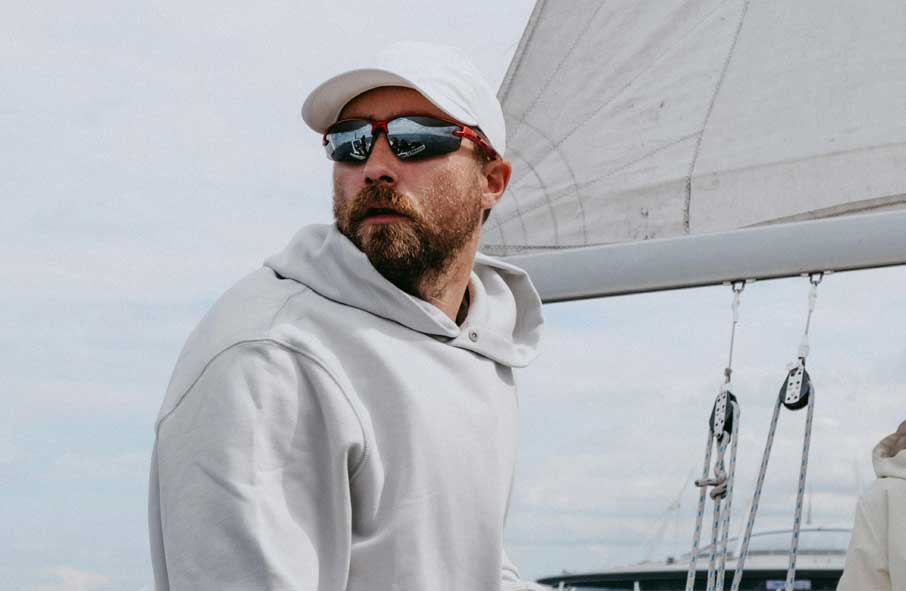
Sea time experience is one of the most important prerequisites.
You would need to have completed the following within the last ten years:
- At least 2500 miles logged.
- Spent 50 days at sea on yachts of up to 500GT.
- At least half the sea time must have been spent in tidal waters.
- Have completed five passages of over 60 miles, of which two passages were as a skipper, and two carried out at night.
- Have at least five days experience working as a skipper.
- Hold a valid First Aid Certificate. In the case of a STCW Elementary First Aid it needs to have been issued within the last five years, whereas in the case of an RYA First Aid it needs to be issued within the past three years.
- Be in possession of a GMDSS short-range VHF radio certificate.
The course duration is generally 5 days, including the exam.
The course content will comprise key areas that will allow one to be properly prepared for the exam.
The instructor will focus on areas where one needs to improve.
Notably, night sailing and blind navigation will be practiced.
There will be an overview of the lights, signals and collision regulations, among others.
Since different ports and harbours will be visited, you will be able to get tested in different waters, and your strengths and weaknesses will be better tackled in preparation for the exam.
The Yachtmaster Offshore Exam itself will take anywhere between 8 to 12 hours for a single candidate, or between 10 to 18 hours for two.
Candidates will be met onboard by examiners who will outline what will happen during the test.
Tasks will be set for the candidates to demonstrate their abilities as skippers of offshore cruising yachts.
Candidates should be well prepared as questions on any part of the syllabus can be asked at any stage.
Examiners will be independent assessors who evaluate candidates on behalf of the UK Maritime and Coastguard Agency .
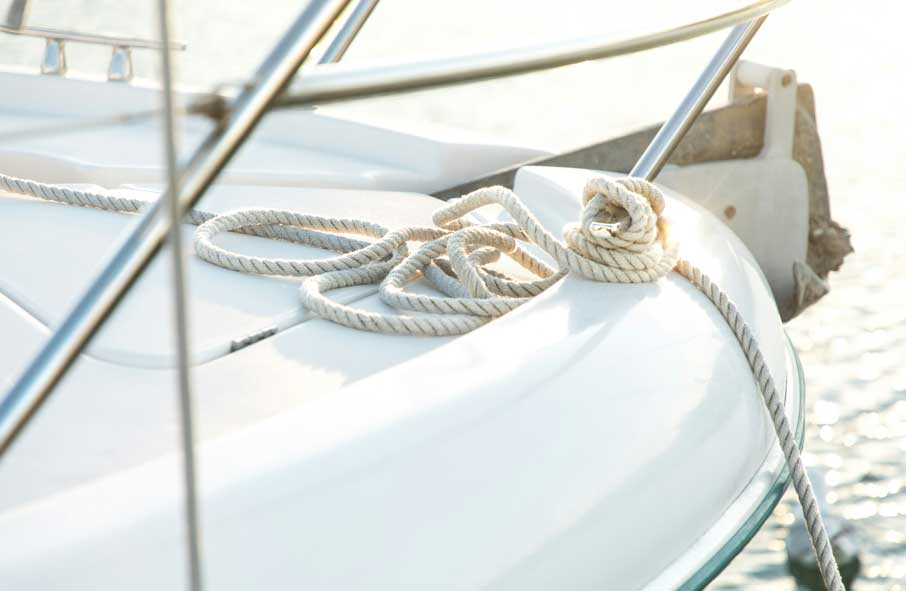
In order to convert from Yachtmaster offshore sail to Offshore Power the following will need to have been completed within the past 10 years:
- At least 1250 miles on a vessel that was between 7m and 24m in length.
- Have spent 25 days living onboard.
- Have spent 3 days as a skipper.
- Have carried out 3 passages exceeding 60 miles, of which one was as a skipper and one overnight.
There are a number of rules that need to be followed when it comes to passages that can be deemed as qualifying.
An applicant will need to have completed at least five passages which exceed 60 miles.
These five passages must have been completed on a vessel that is less than 24 metres in length.
Two of these passages need to have been overnight passages.
In addition, two of them will need to have been where one acted as a skipper.
It’s important to mention that a 60 mile qualifying passage is one where the voyage has been non-stop from the departure port A to departure port B, where A and B cannot be the same place.
The 60 mile distance has to be measured as a straight line from A to B.
The RYA will accept passages that were on board yachts over 24m in length.
However, only 50% of the qualifying sea time can be derived from such passages.
Thus, not more than 2500 miles in all, and one would need to provide a testimonial or a discharge book to confirm them.
The remaining 50% of the qualifying sea time must have been carried out on vessels which ranged between 7m and 24m.
Since so much importance is placed on passages, it’s crucial to record the miles.
Recording miles can be carried out in a RYA logbook G158, or using an Excel spreadsheet.
It’s also good to have a CV detailing one’s sea time.
When logging miles it’s important to take note of key details, including the dates of the passage or trip, the miles sailed on the various passages, the name and type of vessel, and any night hours.
Yes, you must have a valid first aid qualification in order to sit for the Yachtmaster Coastal or Offshore exam.
There are different types of first aid qualifications that are accepted, including:
- The RYA First Aid
- The STCW Elementary First Aid
- Seafish First Aid
It’s common to choose to commercially endorse the RYA Yachtmaster Coastal or Offshore exam qualification once the exam has been successfully completed.
In this case, besides holding a valid first aid and VHF certificate, one will also need an STCW or RYA Sea Survival certificate, as well as either an ENG1 medical certificate or an ML5 medical certificate .
One will also need to complete the RYA’s online PPR course.
Subsequently, one can apply for commercial endorsement through the RYA.
Following STCW Basic Safety Training , the RYA/MCA Yachtmaster Offshore certificate can be endorsed in order to allow the holder to be a skipper both on commercial as well as privately owned vessels.
This includes those exceeding 24m in length.
Yes, in order to become an RYA Yachtmaster Offshore it is highly recommended to know specific aspects of navigation and being able to handle a vessel at sea.
Thus, following a Yachtmaster Offshore Theory course is advisable to improve one’s abilities and competence.
This will inevitably improve one’s chances of successfully achieving the RYA Yachtmaster Certificate of Competence.
Becoming a yacht captain takes several years of training, experience and qualifications.
Like many careers, you’ll need to start life on a vessel working your way up.
From humble beginnings like being a deckhand to a junior crew member, the journey towards becoming a yacht captain takes years of dedication and hard work.
Our guide to becoming a yacht captain explains this process in greater detail.
Yes, the potential to make a very lucrative income is high.
A lesser experienced yacht captain can expect to make in the region of $48,000 to $98,000 per annum, whilst a more seasoned captain can make an impressive $150,000 gross per year.
So the time and effort it takes to become a skipper on a vessel has its rewards.
Furthermore, if your time at sea exceeds 183 days each calendar year, there’s the strong possibility that you could qualify for the seafarers earnings deduction which means you are not obliged to pay any income tax on your earnings.
So the above salary figures could be your final take home.
A good yacht captain will lead the crew, be a good communicator and instil confidence.
Acquiring the RYA Certificate is a demonstration that one has shown such skills along with the necessary experience.
Disclaimer: Any advice in this publication is not intended or written by Marine Accounts to be used by a client or entity for the purpose of (i) avoiding penalties that may be imposed on any taxpayer or (ii) promoting, marketing or recommending to another party matters herein.
Also on Marine Accounts
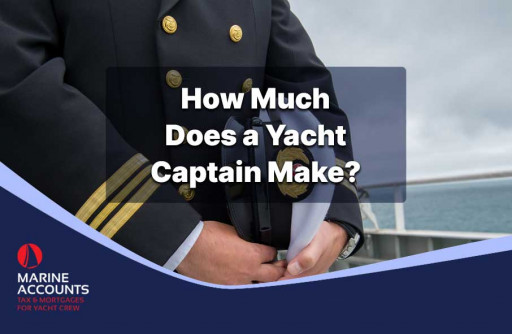
How Much Does a Yacht Captain Make?
Working as a yacht captain is a very privileged and unique employment position. In our article we explore what being a yacht captain involves and how much yacht captains make.
Patrick Maflin
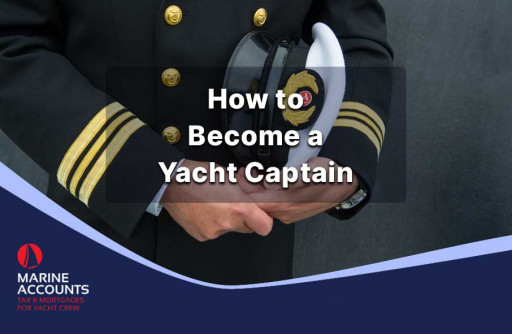
How to Become a Yacht Captain
Working as a captain on a superyacht can be a very rewarding career. But how do you become a yacht captain? Our article takes a deep dive into the process.
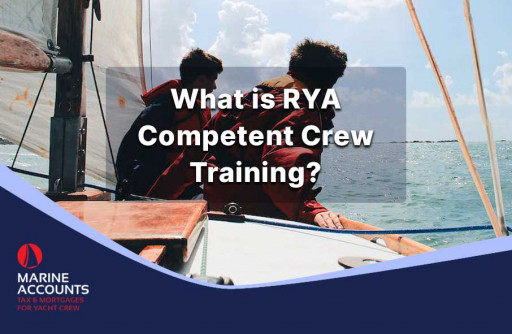
What is RYA Competent Crew Training?
RYA Competent Crew training is a beginners level sailing course, teaching basic knowledge and skills needed to become a competent crew member on a yacht. Read on to discover why even experienced yacht crew should consider taking this foundation course.
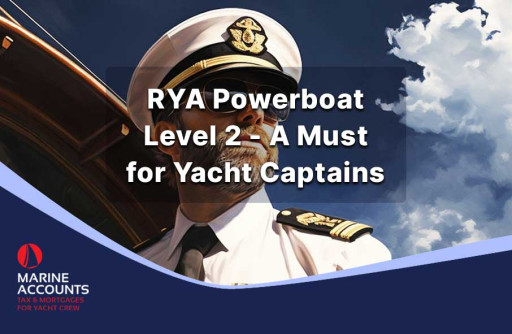
RYA Powerboat Level 2 Certificate - A Must for Yacht Captains
Gaining RYA powerboat level 2 certification is a must for any aspiring yacht captain. In our latest article, we explore what this crucial certificate is for, what you will learn, and how you go about getting one.
Before you go...
You're about to visit a page on our legacy site. We're currently in the process of updating all our tax tools and while this page is still active please return to the main Marine Accounts site after completition.
Refer a friend and receive £50!
Upon successful completion of the referral the cash will be transferred to you.
- Professional qualifications
Working as an RYA Yachtmaster
Your qualification must be appropriate to the vessel and area of operation. For commercial use, all certificates must be commercially endorsed .
Working with an RYA Yachtmaster® Coastal certificate
A commercially endorsed Yachtmaster Coastal Certificate of Competence will enable you to skipper vessels up to 24 metres in length, operating in category 3,4,5, and 6 waters - up to 20 miles from a safe haven.
Working with an RYA Yachtmaster® Offshore certificate
A commercially endorsed Yachtmaster Offshore Certificate of Competence will enable you to work as a Master of commercial vessels of up to 200gt in category 1 to 6 waters - that is up to 150 miles from a safe haven.
This Certificate of Competence can used commercially in its own right, or as a pre-requisite for the MCA's Officer of the Watch qualification, which enables you to work worldwide on vessels of up to 3000gt.
Working with an RYA Yachtmaster® Ocean certificate
A commercially endorsed Yachtmaster Ocean Certificate of Competence will enable you to work worldwide as a Master of commercial vessels of up to 200gt.
This Certificate of Competence can be used commercially in its own right. It is also a pre-requisite for the MCA's Chief Mate, Master 500 and Master 3000 qualifications.
For more information about working with RYA qualifications, the categorisation of waters and required certification click here .

RYA Yachtmaster Offshore / Yachtmaster Coastal / Master of Yachts 200 Course 300
MPT is the most complete full service private maritime school in the country and has been training mariners since 1983. Our Fort Lauderdale based campuses host over 45,000 square feet of classrooms, deck and engineering training labs, the Ship's Store, and student service facilities.
Preparing for RYA Yachtmaster Offshore / Yachtmaster Coastal / Master...
Course description.
Yachtmaster Certificate of Competency
The Yachtmaster Qualification is the pinnacle of the RYA (Royal Yachting Association) Training and Certification System. It is widely recognized throughout the world as a prestigious accomplishment.
Holding this credential can:
- Improve your resume for any deck department position on yachts - Serve as prerequisite training for an MCA OOW 3000 GT CoC - Professional Development in your yachting career - Serve as your Certificate of Competence (CoC) for operators of yachts up to 200 tons
The Yachtmaster Course should be undertaken by crew aspiring to advance to the MCA OOW level up to 3000 tons and by those who are advancing to the command level for Master of Yachts up to 200 tons.
2 Routes Available – Same Course:
Yachtmaster Coastal Yachtmaster Offshore
Yachting professional candidates are encouraged to start their training and professional development as early in their career as possible. Many will take their STCW Basic Safety Training Program (#140) and then when they qualify, it is recommended to obtain the Yachtmaster Coastal CoC. Candidates wishing to upgrade to the offshore route later can simply examine, without additional required training.
Whether you qualify for the Yachtmaster Coastal or Offshore, the training is the same. The only difference is your experience and practical skill level. You will be examined towards whichever level you qualify for.
The MPT Yachtmaster Coastal and Offshore Course (#300) is taught on a Motor Yacht and the practical training and examination are towards a Motor Certificate of Competence. (If you are applying for a Sail Endorsement, this course will not satisfy your practical training and exam requirements). All sea time must be on a power boat and not on a sail boat under power. The Theory, SRC, PPR, and Basic Training courses are the same for both schemes.
The MPT Yachtmaster advanced level certification is available in a 2 week + exam program combining shore-based theory and practical hands-on techniques for a Motor Vessel and the RYA Practical Examination. The first week of class is in the classroom (theory) and the second week is Practical, out on the boat. In addition, there will be class on Saturday of the first week so please plan accordingly.
YACHTMASTER COASTAL & OFFSHORE Subjects Include:
One week (40 hours) of comprehensive shore-based theory module with written assessment papers including navigation, tidal calculations, international and inland rules of the road, coastal pilotage, meteorology, anchoring and mooring, docking and undocking, buoyage systems, safety, voyage and passage planning, general ship knowledge and seamanship. A theory examination will be conducted after the completion of the 40-hour theory portion of the program.
One week of Yachtmaster Offshore/Coastal practical training is conducted on board one of MPT’s Yachts. These yachts are up to 48’ and are twin screw motor yachts. This part of the instruction covers seamanship skills such as nautical terms, tides, marlinespike seamanship, anchor work, boat handling, docking, general yachting skills, basic weather, navigation and passage planning. This course will be a preparation course for your final Yachtmaster Coastal/Offshore Examination. The practical portion of the course will be conducted during daytime, evening and occasionally may include weekend hours.
The Yachtmaster Course #300 is an Advanced Review Course and it is assumed that candidates will have the prerequisite knowledge of the Basics of Navigation and recommended to the level of RYA Day Skipper, and the very least, the level of the Essential Navigation On-line course. To increase your likelihood of success, we recommend taking the online pre-course - ESSENTIAL NAVIGATION. Additionally, flash cards are available in the MPT Ship's Store for rules study in lights and shapes. Also, many Apps are available to assist in these subjects for pre-study. It is also strongly advised that you pick up your study material well in advance of the start of your course. Pre-study is essential for a successful outcome of this course.
The RYA Yachtmaster course is accredited by the RYA and MCA and recognized for service as Captain or Mate (OOW) up to 200gt up to 150 miles from a safe haven, at the Offshore level or up to 60 miles from safe haven at the Coastal level.
The Yachtmaster CoC meets the STCW A-V1/1 and section A V1/1-4 when combined with Basic Training Courses. Yachtmaster Offshore fulfills the prerequisite for MCA OOW 500 and 3000 GT and the MCA STCW A-II/2 Command Certificate for Master 200GT.
Sea Service Prerequisites (minimums): Note you must be able to provide proof of your sea service before undertaking the exam. This should be provided at least 2 weeks before the course when possible to allow our team to review it and ensure your eligibility for the course. Speak to your MPT Career Counselor or your instructor for assistance.
Sea Service can be proven by submitting one or more of the following:
- Log book (RYA or other acceptable)
- Sea Service Testimonial Letters from captains, owners or operators of vessels outlining vessel specifics, time underway, your capacity served onboard and the location of the service (tidal or non-tidal waters, etc).
- Sea Service Forms (calendar style - provided you can supply all of the additional information such as number of miles, etc.) Method 2 is preferred.
Yachtmaster Coastal: Motor - Option 1
Without RYA Coastal Skipper Practical certificate:
- 2 days as skipper on vessels of less than 24 meters
Note: No more than half of the required miles can be on vessels over 24 meters
Yachmaster Coastal: Motor – Option 2 A & B
With RYA Coastal Skipper Practical Certificate:
Can be used to enter OOW 3000GT program and modules
A. Mariners with Coastal Skipper Practical Certificate and with more than half of required sea service on vessels less than 24 meters
- 20 days on board
- 2 days as skipper on vessel less than 24 meters
B. Mariners with Coastal Skipper Practical Certificate and with more than half of required sea service on vessels greater than 24 meters
- 30 days on board
Yachtmaster Offshore: Motor
- 50 days sea time overall on motor vessels
- 5 days in the command position on the vessel (as Master)
- 2500 nautical miles logged with half transiting through tidal waters and half on a vessel of less than 24 meters that is not a tender.
- 5 passages over 60 nautical miles, including 2 overnight and 2 in command (as Master) of vessel.
Yachtmaster Ocean:
- Obtain Yeachmaster Offshore
- Complete the RYA astro/ocean shorebased theory #306
- Ocean passage of 600 nautical miles or more as captain or mate
- Complete oral exam with RYA examiner successfully
For Commercial Endorsement:
In addition to the SRC and First Aid (must have been taken within 5 years) you will need to obtain an MCA Certificate of Medical Fitness (ENG-1) as well as the Personal Survival Training (4 Modules of STCW 210) and the online Professional Practices & Responsibilities (PPR) Certificate. If you are planning to work commercially, you should simply add the STCW Basic Training Program, which will include the approved Personal Survival and First Aid automatically and will also allow your Yachtmaster CoC to have the STCW endorsement as well. Most boats internationally require this of all crew working commercially. We also recommend the Security Awareness or Designated Security (VPDSD) Course if you are working commercially as well. These are all separate fees from the Yachtmaster Course however MPT offers Package discounts, speak to an MPT RYA Specialist for more information and assistance. There is also a fee candidates will pay to the RYA for the commercial endorsement.
Written & Practical Exam Information:
The written exams are administered at MPT at the end of the shore-based theory segment of your program. They include all of the topics covered in the course. All of the shore-based courses and experience criteria must be fulfilled before the RYA Examiner will conduct the practical assessment. The final exam will be conducted by an independent and unbiased RYA Yachtmaster examiner and takes the form of an extensive oral and practical examination on a motor yacht. Candidates who have taken MPT's Yachtmaster course may use one of the MPT vessels for the exam at no additional fee. The practical exam will take an additional one-two day and is scheduled when the examiner is available and generally immediately after the course, weather permitting. Once your eligibility has been reviewed (sea time and prerequisites met), the schedule for the practical examination is predicated on several things:
1)The weather as this is a practical underway examination 2)The availability of the RYA Examiner (this is not an MPT employee)
Examinations may need to be scheduled for additional days which may not be consecutive to the dates of the course.
Exam Subjects:
We will review with you the knowledge-based subjects during your shore-based theory week and also fine tune your boat handling skills during your practical course, but you should be familiar with the following areas when you join the class and proficient by the exam date. (Note if you are not already well versed in these subjects when you arrive, you are strongly encouraged to take the Essential Navigation (online course) as there is not sufficient time to cover the basics in the 2-week program. Ask about #333)
- Knowledge of the International and Inland Rules of the Road.
- Safety. The candidate will be expected to know what safety equipment should be carried on board a yacht.
- Boat Handling, Maneuvering, Docking: Yachtmaster Coastal students will be expected to answer questions & demonstrate ability in simple situations only. Yachtmaster Offshore candidates are expected to demonstrate ability in more complex situations and will also be expected to show a higher level of expertise.
- General seamanship, including maintenance.
- Responsibilities of the skipper
- Navigation, Basic Weather
- Radio Communication & Signaling
- Command presence, management and direction of crew.
- Essential Navigation (online course)
Practical Exam Fees:
The RYA Examination Fee for the initial examination will be paid by MPT as part of your course tuition. Additional RYA fees are paid by candidate if a subsequent examination is needed.
If at the end of your course you wish to postpone the practical exam date, you are permitted to return for exam and RYA exam fee paid by MPT, within one calendar year, space permitting.
Additional Recommended or Required Courses:
- Essentials of Navigation (Online Pre-Course) #333
- First Aid & CPR #143 or Take STCW Basic Safety Training #141, 142, 143, 144
- SRC VHF Radio License #303 Required (offered Online) or GMDSS GOC #404
- RYA PPR (Professional Practices & Responsibility) #335 ONLINE COURSE
- MCA Approved Engine Course #440
- USCG Radar Course #148 & ARPA Course #150 or MCA Nav/Radar/ARPA Course #402
If you have three years of yacht service, speak to a career counselor about continuing straight through your OOW or Chief Mate 3000 GT program.
Required Materials
RECOMMEND PRE-STUDY: Essential Navigation online, course #333, COLREGS Study Apps or flashcard, and course notes. AVAILABLE IN MPT SHIPS STORE or bring with you the following: Pencil (mechanical or #2) Paper Chart Eraser (We recommend white- like magic rub or Staedtler), Navigation Tools (parallel rules/Portland plotter/triangles – your choice), Dividers (we recommend two- one as divider and one as compass), Calculator (we recommend the TI-30x), Hand Bearing Compass - optional though recommended (We recommend Weems & Plath #2004). Pick up at MPT when you register or when you check-in: Yachtmaster Shore based Training Manuals & Charts (provided by MPT).
11 day class in Fort Lauderdale
RECOMMENDED PRE-STUDY: Available at MPT Ships Store Complete Course Training DVD Flashcards AVAILABLE IN MPT SHIPS STORE OR BRING WITH YOU: Pencil (mechanical or #2) Paper Chart Eraser (We recommend white - like magic rub or staedtler) Navigation Tools (parallel rules/Portland plotter/triangles - your choice) Dividers (we recommend two - one as divider and one as compass) Calculator (we recommend the TI-30x) Hand Bearing Compass (We recommend Weems & Plath #2004) PICK UP AT SCHOOL WHEN YOU REGISTER OR WHEN YOU CHECK-IN: Yachtmaster Shorebased Training Manuals & Charts (provided by MPT)
Course Photos

Testimonials
Not suggestions. Thanks for letting me be your student! Alejandro, Friday August 2015 RYA Yachtmaster Offshore / Yachtmaster Coastal / Master of Yachts 200
A bit more time would be nice! But Steve was an awesome instructor.Very easy to follow and very thorough. Arthur, Wednesday November 2013 RYA Yachtmaster Offshore / Yachtmaster Coastal / Master of Yachts 200
1915 South Andrews Avenue, Fort Lauderdale, FL 33316, +1-954-525-1014 | +1-888-839-5025 (Toll Free)
Site map | privacy notice | cookie policy | accessibility notice, 1915 south andrews avenue, fort lauderdale, fl 33316 +1-954-525-1014 +1-888-839-5025 (toll free).

RYA Yachtmaster™ Exams
An rya yachtmaster™ certificate of competence is often the ultimate aim of aspiring skippers., rya yachtmaster™ certificate of competence exams.
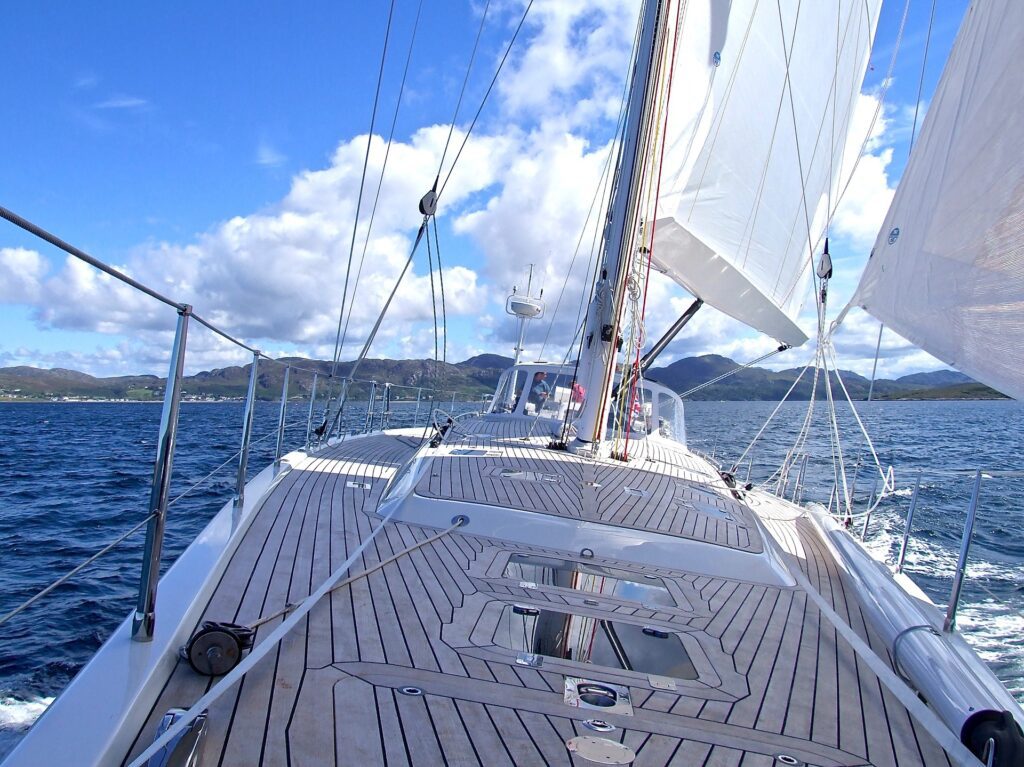
The RYA Yachtmaster™ Certificate of Competence is well known and highly respected worldwide, proving your experience as a skipper. Unlike the other courses in the RYA Sail Training Scheme, there is no formal syllabus to complete in order to attain an RYA Yachtmaster™ Certificate of Competence.
We highly recommend attending our RYA Yachtmaster™ preparation course to fine tune your sailing skills and focus your knowledge base before the exam.
RYA Yachtmaster™ Certificate of Competence – Coastal or Offshore?
The RYA Yachtmaster™ Coastal means that you have knowledge needed to skipper a yacht on coastal cruises. You do not necessarily have the experience needed to undertake longer passages. The exam will include an assessment of your skippering skills, boat handling, general seamanship, navigation, safety awareness and knowledge of the IRPCS (collision regulations), meteorology and signals. You will be set tasks to demonstrate your ability and may also be asked questions on any part of the syllabus for all practical and theory courses up to Yachtmaster™ Coastal level.
The RYA Yachtmaster™ Offshore deems you competent to skipper a cruising yacht on any passage during which the yacht is no more than 150 miles from harbour. The exam will include an assessment of your skippering skills, boat handling, general seamanship, navigation, safety awareness and knowledge of the IRPCS, meteorology and signals. You will be set tasks to demonstrate your ability and may also be asked questions on any part of the syllabus for all practical and theory courses up to Yachtmaster™ Offshore level.

RYA Yachtmaster™ Certificate of Competence Commercial Endorsement
RYA Yachtmaster™ Certificates of Competence can be commercially endorsed in order to work on board British flagged vessels, subject to the MCA’s codes of practice for small commercial vessels. A number of additional training courses and medical fitness certificates are required to be eligible for a commercial endorsement . We offer the online RYA Personal Practices and Responsibilities course – email us to book .
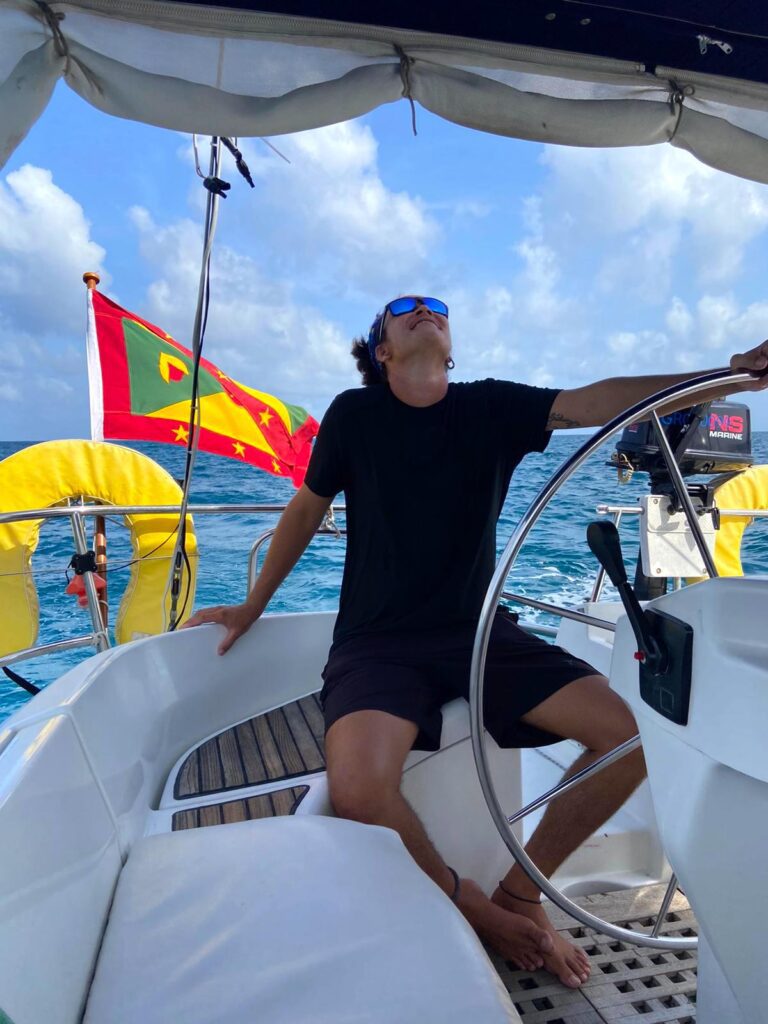
RYA Yachtmaster™ Mile/Experience Building Charters
If you do not have the required experience and sea time, we recommend booking on our Bluewater Sailing mile/experience building cruises . We offer these adventurous training trips throughout the year in the Caribbean.
RYA Yachtmaster™ Preparation Course
Many RYA Yachtmaster™ candidates choose to complete our Yachtmaster™ preparation course for the benefit of tailor-made sailing tuition prior to the examination. Provided that you have sufficient experience and sea time, you are then put forward immediately as a candidate for the Yachtmaster™ exam. Click here for helpful information from the RYA on passing your exam.
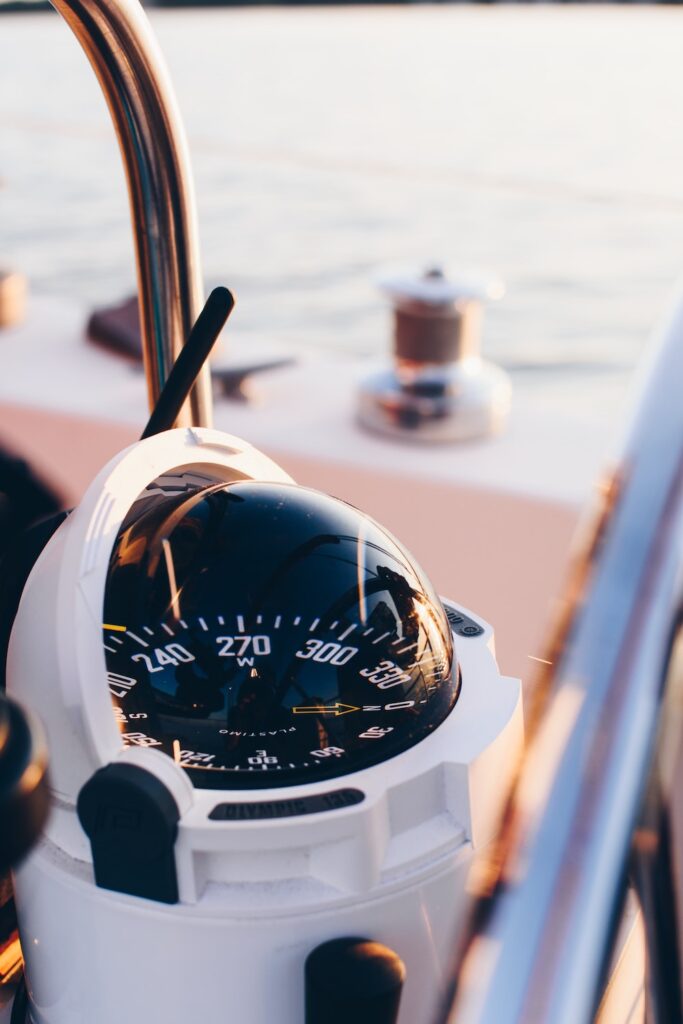
Working with a Yachtmaster™ Coastal Certificate
A commercially endorsed Yachtmaster™ Coastal Certificate of Competence will enable you to skipper vessels up to 24 metres in length, operating in category 3,4,5, and 6 waters – up to 20 miles from a safe haven.
Working with a Yachtmaster™ Offshore Certificate
A commercially endorsed Yachtmaster™ Offshore Certificate of Competence will enable you to work as a Master of commercial vessels of up to 200gt in category 1 to 6 waters – that is up to 150 miles from a safe haven. This Certificate of Competence can used commercially in its own right, or as a prerequisite for the MCA’s Officer of the Watch qualification, which enables you to work worldwide on vessels of up to 3000gt.
Working with a Yachtmaster™ Ocean Certificate
A commercially endorsed Yachtmaster Ocean Certificate of Competence will enable you to work worldwide as a Master of commercial vessels of up to 200gt. This Certificate of Competence can be used commercially in its own right. It is also a prerequisite for the MCA’s Chief Mate, Master 500 and Master 3000 qualifications.
RYA Yachtmaster™ Exam Prerequisites
Rya yachtmaster™ exam details, rya yachtmaster™ ocean certificate of competence.
Holders of the Yachtmaster™ Ocean Certificate of Competence are experienced and competent to skipper a yacht on passages of any length in all parts of the world.
Full details of the exam syllabus and requirements are shown in the RYA Yachtmaster™ Scheme Syllabus and Logbook (G158). The exam consists of an oral and written test.
The candidate must provide the examiner with the following information 48 hours prior to the exam:
- A narrative account of the planning and execution of the qualifying passage providing all relevant details.
- Navigational records, completed on board a yacht on passage, out of sight of land showing that the candidate has navigated the yacht without the use of electronic navigational aids. The records must include as a minimum, planning, reduction and plotting of a sun run meridian altitude sight and a compass check carried out using the bearing of the sun, moon, a star or planet.
During the oral test the candidate will be required to answer questions on all aspects of ocean passage making in a yacht, including passage planning, navigation, worldwide meteorology, crew management and yacht preparation, maintenance and repairs.
The written exam will include questions on sights and sight reduction and worldwide meteorology.
Candidates who hold the RYA/MCA Yachtmaster™ Ocean Theory Course Completion Certificate (final exam must have been invigilated at an RYA RTC), or a MCA issued full STCW Certificate of Competence as a Deck Officer (Unlimited) will be exempt from the written examination.
Before you book your exam please check that you:
- have completed the required mileage and experience as skipper
- have read the syllabus in RYA Logbook (G158)
- have read and comply with the pre-requisites above.
If you need your Certificate of Competence in order to work on board a commercial craft subject the MCA’s codes of practice, you will need to get it commercially endorsed .
Please note: Only those who hold the RYA Yachtmaster™ Offshore Certificate of Competence are eligible to receive the Yachtmaster™ Ocean Certificate of Competence on passing the oral exam. Those holding OOW (Yacht 3000gt) will receive a pass confirmation certificate.
RYA Yachtmaster™ Ocean Exam Prerequisites

Chieftain Training
RYA & STCW Courses – Sail, Power, Super-Yacht & Workboat
What is an Ocean Yachtmaster
What is an ocean yachtmaster and how to become an ocean yachtmaster.
The RYA/MCA Ocean Yachtmaster Certificate of Competence (CoC) is the highest level certificate in the RYA scheme. It can be used by blue water leisure sailors and by commercial skippers and crew. Under the MCA Codes of practice the Ocean Yachtmaster Certificate of Competence holder, (with relevant commercial endorsement etc.) can skipper a vessel;
- Up to 200 tonnes
- Carrying up to 12 passengers
- Anywhere globally (i.e. beyond the 150 miles from a safe haven limit imposed upon a Yachtmaster Offshore).
Furthermore the Yachtmaster Ocean CoC is the minimum requirement for certain officer positions on board larger (over 200 tonne) yachts.
There are 5 stepping stones to becoming an Ocean Yachtmaster CoC holder. Steps 1-4 can be taken in any order although the order presented below is the most logical. Step 5 can only be completed once the first 4 steps have been completed.
- Yachtmaster Offshore Certificate of Competence
RYA Ocean Yachtmaster Shorebased Course
- Qualifying Passage
- Sights and Compass Check by sextant at sea
RYA/MCA Ocean Yachtmaster Certificate of Competence Oral Exam
It is technically possible to take the Ocean Yachtmaster CoC Oral exam without having previously completed the RYA Ocean Shorebased Course but not advised as it involves an additional written exam and you would require all of the relevant knowledge taught on the course. Further information is detailed the relevant 5 steps below;

Becoming a Yachtmaster Offshore Certificate of Competence Holder
While you can proceed towards the RYA Ocean shorebased course and the Ocean practical steps (qualifying passage and sights) you can not proceed to the Oral exam without first holding the Yachtmaster Offshore Certificate of Competence.
This is a 40-hour theory course. It can be taken;
- Over 5 consecutive days face to face in the classroom
- Over 13 evenings face to face night school in the classroom
- Over 5.5 days face to face using zoom
- Online in your own time.
Whichever format you choose the course culminates in a written paper.
The course concentrates on astro navigation, i.e using a sextant and the heavenly bodies (sun, moon, stars and planets) to fix your position. The course also devotes time to ocean voyage planning and worldwide meteorology.
Full details can be found at Ocean Yachtmaster Shorebased Course

While you don’t strictly need to be a Yachtmaster Offshore before taking the Ocean Yachtmaster Shorebased Course , the following knowledge is assumed before the Ocean Shorebased course starts;
- Use of plotting instruments (plotter, dividers etc.)
- Latitude and longitude, knots and nautical miles
- Variation and deviation
- Application of UT, DST
- 2/3 Point fixes and angles of cut
- Dead Reckoning / EP (and ideally the Running Fix)
- GPS and other electronic nav aids
- Coastal/offshore voyage planning
- Sources of forecast information
- Synoptic charts
- Low pressure systems
- Coastal communications /distress comms. (Navtex, VHF, EPIRBs and SARTs)
Is the Ocean Shorebased Written Exam Invigilated?
If you take a face to face Ocean Yachtmaster Shorebased Course then the written paper is invigilated and marked by your Instructor.
If you choose to take the Online or Webinar RYA Ocean Yachtmaster Shorebased Course then face to face invigilation may be required (see table below).
What qualifies as a RYA Yachtmaster Ocean Qualifying Passage?
A qualifying passage must have been taken in the last 10 years. Sea time prior to this date does not qualify. The passage must meet the following requirements
Ocean Candidate’s Role On Board
For your qualifying passage you should be either the skipper or mate in sole charge of a watch. You must have been fully involved in the planning of the passage, including selection of the route, the navigational plan, checking the material condition of the vessel and her equipment, storing with spare gear, water and victuals and organising the watch-keeping routine.
If the skipper changes role at any point during the passage, then neither skipper can use the passage as a qualifying passage.
It is our opinion that it is impossible for multiple Ocean Yachtmaster candidates to use the same passage as their qualifying passage as you can not all fit the definitions above. More than two candidates would be highly unlikely more than three impossible.
Ocean Qualifying Passage
The passage has several minimum requirements
- Departure and arrival ports must be more than 600 miles apart by the shortest navigable route
- Minimum non-stop distance of 600 miles must have been run by the log
- At least 200 miles of that passage must have been more 50 miles from land (or charted objects capable of being used for navigation/position fixing, such as an offshore oil rig)
- The vessel must have been at sea continuously for at least 96 hours
Passages such as recognised races which may not comply exactly with these requirements may be submitted to the RYA for consideration before the voyage.
Examples of Ocean qualifying passages (non stop passages)
- Trans-Atlantic ARC Rally (Canary Islands to St. Lucia/Caribbean)
- Between Azores and anywhere in mainland Europe/UK or the Canary Islands
- Between Bermuda and any of; Bahamas, Caribbean, Canada or most of USA (parts of North Carolina fall below the requirements)
- Between Bermuda and the Azores or Europe
- Solent/UK to Cascais/Portugal,Algarve, Southern Spain or Gibraltar (assuming you follow the rum line or stay offshore when crossing Biscay)
- Trans Pacific Passage (excluding passages between Alaska and Russia, on or close to the Bering Sea)
- Atlantic Germany (Elbe) to Scotland, where the 200 mile run is impossible due to oil rigs)
- Gibraltar to Northern Lanzarote where the mileage falls slightly below 600
- RORC Fastnet Race which does not follow the shortest navigable route or have the 200 mile run
- Northern Spain to Majorca, although well over 600 miles, very little of the passage is over 50 miles from land
If you still are not sure about whether a passage qualifies, then check out the RYA’s definition of a qualifying passage .
Vessel used for Ocean Qualifying Passage
The yacht (or vessel) must be;
- Minimum size 7m, LWL
- Maximum size 500 tonnes (If the vessel is over 24m LOA then the candidate would need to hold an appropriate Certificate of Competence to act as Officer of the Watch on the passage).

Sights and Compass Check by Sextant at Sea
You are required to provide your Ocean Examiner with a minimum of’
- Sun Run Mer Pass (or sun run sun, sun run planet etc.)
- Compass check carried out using the bearing of the sun, moon, a star or planet
Sights are usually taken on the qualifying passage however in some circumstances (such as lots of cloud cover) this is not possible. If sights have been taken on another passage then the following requirement apply to this passage.
- The vessel must of been out of sight of land and charted objects when the sights are taken/used.
- The vessel must be on a passage by the shortest navigable route. You can not therefore simply head offshore take sights and return to departure port.
We always advise candidates to present the examiner with more than the minimum required sights. If you present the examiner with additional sights and your preferred set suffers from errors you still stand a chance of passing the exam.
Prior to the exam you will need to provide the examiner with;
- A narrative account of the planning and execution of the qualifying passage providing all relevant details.
- Navigational records, completed on board a yacht on passage, out of sight of land showing that the candidate has navigated the yacht without the use of electronic navigational aids. The records must include as a minimum, planning, reduction and plotting of a sun run meridian altitude sight and a compass check carried out using the bearing of the sun, moon, a star or planet.
During the oral exam you will be required to answer questions on all aspects of ocean passage making in a yacht, including passage planning, navigation, worldwide meteorology, crew management and yacht preparation, maintenance and repairs.
If you already hold the RYA Ocean Shorebased Course Certificate , the exam typically takes 1.5 hours although examiners can continue questioning considerably longer. If you do not hold the Ocean Shorebased certificate then your exam will take considerably longer as you will also have to take a written test.
Does the Ocean Yachtmaster Qualifying Passage have to be on the same type of vessel as I took my Yachtmaster Offshore Exam on (i.e. power or sail)?
Most candidates will qualify in the same kind of vessel as they passed their Offshore exam, however it is possible to qualify as a Yachtmaster Offshore (power) and then compete the Yachtmaster Ocean requirements on a sail vessel (or vice versa).
I hold a OOW (Yacht 3000gt) CoC but not a Yachtmaster Offshore CoC
If you passed the Yachtmaster Coastal Certificate of Competence Exam instead of the Yachtmaster Offshore Certificate of Competence Exam as your entry requirement into the OOW 3000 CoC then you will not be eligible to hold the Yachtmaster Ocean Certificate of Competence. On passing the oral exam you will receive a pass confirmation certificate.

How do I commercially endorse the Yachtmaster Ocean Certificate of Competence?
Those working under the MCA Codes of practice will require a commercial endorsement. Information can be found at RYA Commercial Endorsements . If you already hold a commercial endorsement on your Yachtmaster Offshore CoC then it is simply transferred across.
Do I require any other certificates to operate commercially as an Ocean Yachtmaster?
To operate a coded sailing yacht in Category 1 or 0 waters (i.e. Over 60 miles from a safe haven) you will additionally require a RYA Diesel Certificate .
To operate the mandatory GMDSS radio equipment on a commercial vessel in Sea Area A2 (more than about 35 miles offshore) you will require either a Long Range Certificate (LRC) or STCW General Operator Certificate (GOC) .
To skipper a coded vessel in Category 1 or 0 waters (i.e. Over 60 miles from a safe haven) you will additionally need to hold STCW Proficiency in Medical First Aid and Proficiency in Medical Care, unless there is a current qualified nurse practitioner (or higher) on board.
If working aboard a vessel in Category 1 or 0 waters (i.e. Over 60 miles from a safe haven) you will need a ENG1 Medical certificate. The alternatives which are suitable further inshore such as ML5 Medical Certificate are not valid in category 1 and 0 waters.
Share this:
- Certificates of Competence
- RYA Yachtmaster Offshore exam
RYA Yachtmaster Offshore Exam
Full details of the exam syllabus and requirements are shown in the RYA Yachtmaster Scheme Syllabus and Logbook (G158) available from the webshop (see right).
RYA Yachtmaster Offshore practical exams can be taken under sail or power and your certificate will be endorsed accordingly. The candidate or a training centre provides the boat and the RYA provides an examiner. Note: All qualifying sea time and passages must be gained on vessels appropriate to the type of exam i.e. gained in sailing vessels for a sail exam and power vessels for a power exam.
There is no formal training course leading up to the exam, but those who have not previously taken RYA courses often find it useful to book themselves in for some informal training at an RYA centre prior to their exam. This training can be tailor-made to your specific needs and helps to fill any gaps in your knowledge that may become apparent.
The exam will include an assessment of your skippering skills, boat handling, general seamanship, navigation, safety awareness and knowledge of the IRPCS, meteorology and signals.
Boats used for exams
You may use your own boat or a boat that you have chartered or borrowed. You will be responsible for ensuring the boat is seaworthy and suitable for the area in which the exam takes place and equipped as shown below.
The boat used must be between 7m and 18m (LOA) and be in sound, seaworthy condition, equipped to the standard set out in the RYA Boat Safety Handbook 2nd Edition (code G103). The boat must be equipped with a full up to date set of charts and navigational publications along with working instruments and either plotter or GPS. In addition to the candidate there should be two crew on board as the examiner will not take part in the management of the boat during the exam.
There may be vessels that will meet the guidelines outlined above but by virtue of their layout, construction, handling characteristics or other factors may be unsuitable for use for an RYA Yachtmaster Practical examination. The RYA reserves the right to refuse an exam on a vessel that, in the view of the RYA Chief Examiner, will not allow the examiner to conduct an examination to the standard required by the RYA/MCA Yachtmaster Qualification Panel.
Before you book your exam please check that you:
- can provide a boat
- have completed the required mileage and experience as skipper
- hold an SRC (Short Range Certificate) or higher level GMDSS radio operators qualification
- hold a valid first aid certificate
- have read the syllabus in RYA Logbook (G158)
- have read and comply with the pre-requisites above.
Additionally if not on the boat, you will need to bring to the exam:
- laminated or waterproof charts
- GPS set (may be hand held)
- tide tables
- pilotage information for the local area, eg pilot books, port information etc
- plotting instruments.
- Photographic ID card or document, such as a passport or driving licence
If you need your Certificate of Competence in order to work on board a commercial craft subject the MCA's codes of practice, you will need to get it commercially endorsed .
Useful links
Arranging your exam, commercial endorsements, exam payments service, mca manning requirements, professional qualifications.
Yachtmaster Coastal / Offshore Theory
The Royal Yachting Association Yachtmaster certificate has become the industry standard qualification after the entry-level stage. It is the first formal training in navigation and seamanship that deckhands receive on their path to higher MCA issued certificates and it is a vital part of their maritime education. This course equips you to navigate safely on coastal and offshore passages. It will take your theory knowledge to the standard required for the Yachtmaster Coastal and Yachtmaster Offshore practical exams, concentrating on advanced navigation and meteorology skills.
Instructor student ratio 1:8
You will learn:
• position fixing
• course shaping and plotting
• tidal knowledge
• use of almanacs and admiralty publications
• electronic position finding equipment
• taking and interpreting forecasts
• plotting weather systems
• weather predictions using a barometer and by observation
• collision regulations
• customs and excise regulations for cruising abroad.
For MCA OOW, Chief Mate and Master Certificates it is a requirement that this theory course is successfully completed as part of the training. This course is fully redeemable with your ONE Account vouchers (excluding exam fee).
We provide this yacht training course in Antibes.
3 exam papers over the duration of the course
GMDSS SRC Marine Radio (VHF) , Elementary First Aid (STCW Code A-VI/1-3)
- Navigational knowledge of Day Skipper standard
- Professional Practices and Responsibilities (PPR) Online test (for commercial endorsement)
- 2500 sea miles (at least half in tidal miles and half in vessels between 7mLWL-24m LOA sub 80GT and all below 500GT), 50 days at sea, 5 passages over 60nm in vessels between 7m LWL-24m LOA and sub 80GT - including: 2 overnight passages and 2 as skipper
- Personal Survival Techniques (for commercial endorsement)
- I have a sufficient level of spoken and written English to understand the course content and to pass any verbal or written assessments.
RYA Certificates of Competence, Part 5 - Yachtmaster Ocean
Sailing qualification recognised around the world as a clear mark of your sailing ability.
By Marcin Wojtyczka
In this article in series about RYA certifications we reveal how to pass the RYA Yachtmaster® Ocean Certificate of Competence.
The RYA Yachtmaster Ocean Certificate of Competence is proof that you have the knowledge and experience needed to skipper a yacht on passages of any length in all parts of the world. The RYA Yachtmaster Ocean is the highest certification level at RYA.
The holder of a Yachtmaster Ocean qualification should be competent to skipper a yacht of up to 24 metres LOA (up to 200gt) anywhere in the World (Category 0 waters - unlimited).
The assessment is done by oral interrogation (~1.5 hours). You also need to pass the written (~1.5 hours) exam if you did not complete the Ocean Theory course, complete a qualifying passage, and prepare narrative account and navigational records. You have to stand to attention before seasoned RYA-appointed examiner and convince him that you sailed as skipper or first mate and that you know the job. To be honest, there is probably no better way of doing it.
Don’t treat the examination just as an exam. This is a great opportunity to get feedback on your skills and become a better sailor.
Requirements
You can find the official requirements here .
- Hold an RYA Yachtmaster Offshore Certificate of Competence
- Have completed a qualifying passage which meets the following criteria: You were fully involved with the planning of the passage, including a selection of the route, the navigational plan, checking the material condition of the yacht and her equipment, spare gear, victuals and organising the watch-keeping routine. Throughout the passage you must have acted in a responsible capacity either in sole charge of a watch or as a skipper. Qualifying passage should be non-stop by the shortest navigable route with no change of skipper. During the qualifying passage a minimum non-stop distance of 600 miles must have been run by the log, the yacht must have been at sea continuously for at least 96 hours and the yacht must have been more than 50 miles from land or any charted navigational object while sailing a distance of 200 miles. You can find the exact requirements of the qualifying passage here . If you have any doubts about whether your chosen route qualifies, you can always contact RYA at [email protected] During the qualifying passage you should take some sights to prove that you are actually capable of navigating out of sight of land by astro navigation. If circumstances prevent astro sights from being taken on the ocean-qualifying passage you can also take them on another shorter passage. You just have to make sure to be enough far from shore so that the sights are taken out of sight of land.
Preparation
Before taking the oral exam, it is recommended to take Yachtmaster Ocean Theory course . If you complete the course, you will be exempted from the written examination.
Please also take a look at our routes . On all our offshore passages we are navigating using celestial navigation. Some of our passages qualify for the RYA Yachtmaster Ocean certification where you can be a watch leader to meet the qualifying passage requirements. Many of our participants passed the prestigious RYA Yachtmaster Ocean exam and keep returning year after year to us in order to become yet more confident and experienced. Our practical on-the-water training builds confidence, teaching you everything from basic terminology and safety tips to how to skipper a yacht and manage its crew.
Exam Syllabus
During the oral exam, the questions should generally be related to your qualifying passage but may also refer to longer passages if needed to find out if you are capable of an ocean crossing. You may be required to answer questions on all aspects of ocean passage-making in a yacht, including passage planning, navigation, worldwide meteorology, crew management and yacht preparation, maintenance and repairs.
After booking the exam and at least 1 week before the exam date you must provide the examiner with:
- A narrative account of the planning and execution of the qualifying passage.
- Navigational records, completed on board a yacht on passage, out of sight of land, showing that you navigated the yacht without the use of electronic navigational aids. As a minimum, this should include the planning, reduction, and plotting of a sun-run-meridian altitude or sun-run-sun sight and a compass check carried out using the bearing of the sun, moon, star or planet.
The examiner will not be hard on you if you provide a good narrative account and lots of navigational records. You should show him or her that you thought about many aspects of voyage planning and execution, and that you care about the safety of the yacht and the crew. You will definitely fail if you show a cavalier altitude.
The narrative should include the following:
- Brief description of the chosen vessel and suitability for the voyage
- Crew selection
- Pre-checks on the condition of the yacht, including hull, rigging, engine, electrics and fittings checks
- Navigational passage planning: route selection, sources of information to decide on a strategy, expected and possible durations of the passage if no wind/rig failure/divert to the port of refuge etc.
- Navigational equipment: electronic and manuals
- Weather: source of information pre-departure, weather forecasting sources on passage, actual weather experienced
- Harbours planned: pilotage, reporting, berthing, customs and immigrations procedures
- Ports of refuge
- Watchkeeping rota
- Consumables provisioning: victualling (water and food) and fueling/bunkering - estimating daily usage, the amount carried, allowance for delays, calms and emergencies, preparation for what-if scenarios (e.g. contamination of water, fridge failure etc.)
- Consumables monitoring en route: fuel, gas, food, water, battery
- Methods of charging batteries, battery capacity and electrical consumption calculations
- Medical kit carried and preparation for medical emergencies (e.g. availability of suitable courses)
- Standing orders
- Safety briefing conducted
- Routine equipment checks and maintenance, precautionary replacements
- Drills practices before departure and during the passage
- Fire precautions
- VHF / HF / MF channels monitored
- Communications equipment carried
- Position reporting to shore stations
- Navigational hazards including shipping lanes and shallows
- Expected shipping traffic and other vessels encountered (e.g. fishing fleets)
- Use of courtesy ensigns and Q flag
- Emergency (contingency) plans: MOB, rig failure, hull breach, steering failure, port/hatch failure, engine failure, abandon ship, divert to the port of refuge, heavy weather preparation and tactics, emergency repairs (e.g. jury-rigging, repairing damage to the hull, jury-steering)
- Spare gear and tools required, carried and used
- Deck safety: clipping on and numbers of the crew on deck
- Charts and publications used
- Copy of ship’s log and charts
- Navigation by sextant: all written sight reduction, compass check and plotting sheets completed at sea (not tidied up ashore)
- Procedure for cleaning and securing the yacht at the end of the passage
Example of RYA Yachtmaster Ocean narrative.
The written exam will include questions on celestial navigation (sights and sight reduction) and worldwide meteorology.
If you hold the RYA Yachtmaster Ocean shorebased course completion certificate you will be exempted from the written examination.
Learning materials
- Celestial Navigation in practice - Astro navigation primer.
- Celestial Navigation - With the Sight Reduction Tables with Pub. No 249 - This book gives the clearest explanation of how celestial navigation works and how to use it without bogging down in theory.
- How to use sextant (PDF) , Video
- RYA Certificates of Competence
- Certificates
Join our newsletter to get the news about new routes
Put-in tours
Original tour agency in moscow and st petersburg..
Onboard a Soviet van!
Welcome to Russia!
We are Sergey and Simon, a Russian and a Frenchman, both passionate about Moscow, Saint-Petersburg and classic cars. Together, we have created Put-in tours. Our goal is to help you experience Russian culture off the beaten path. Join us onboard our classic Soviet van and let’s get rolling!
In Moscow we offer you a city tour to discover most of the city in an original way as well as a night tour to admire the lights. Our pubcrawl is ideal to explore Moscow’s night-life and have fun. If you are craving to discover Russian culture, come impress your senses during our monastery diner or join our 100% Russian Banya Excursion . The latest will also bring you to Sergiyev Posad and it’s famous monastery!
For the most extreme travellers, our shooting tour will deliver your daily dose of adrenaline whereas our tank excursion will let you ride a real tank and shoot a bazooka.
We also offer help to receive your visa , safe and multilingual airport transfers , as well as organisation services for team-building events or bachelor parties .
All our excursions (but the monastery diner) happen onboard our Soviet military vans and can be covered by our professionnal photographer or videographer.
In Saint Petersburg
We welcome you in Saint Petersburg onboard our Soviet van to discover the imperial city with our city tour and night tour .
Continue your discovery in style! The adrenaline lovers will like our shooting tour which brings 3 Russian weapons to the tip of your trigger finger.
Follow us on Social Media...
Our partners
© Copyright 2021 - Put-in tours Designed by SD Marketing & Design
At Put-in tours, we put you in our classic Soviet vans to go explore Moscow, Saint Petersburg and Russian culture off the beaten path. Discover our Moscow city guided tour, visit Moscow by night, join our banya & Sergiyev Posad excursion, visit and dine in one of Moscow's oldest monastery or even Luzhniki stadium, before you party on our famous pubcrawl! Original and atypical tours : Shoot AK47 and a bazooka after riding on a tank with our tank & bazooka excursion ! Extreme tours: Fly a fighter jet in Moscow onboard a L-29 or L-39 aircraft!
© Copyright 2021 – Put-in tours
Design web: SD Marketing & Design
Home About us Videos Moscow Saint-Petersburg Contact Online booking Blog Disclaimer Privacy Policy
WhatsApp us

Rosatom Starts Production of Rare-Earth Magnets for Wind Power Generation
TVEL Fuel Company of Rosatom has started gradual localization of rare-earth magnets manufacturing for wind power plants generators. The first sets of magnets have been manufactured and shipped to the customer.

In total, the contract between Elemash Magnit LLC (an enterprise of TVEL Fuel Company of Rosatom in Elektrostal, Moscow region) and Red Wind B.V. (a joint venture of NovaWind JSC and the Dutch company Lagerwey) foresees manufacturing and supply over 200 sets of magnets. One set is designed to produce one power generator.
“The project includes gradual localization of magnets manufacturing in Russia, decreasing dependence on imports. We consider production of magnets as a promising sector for TVEL’s metallurgical business development. In this regard, our company does have the relevant research and technological expertise for creation of Russia’s first large-scale full cycle production of permanent rare-earth magnets,” commented Natalia Nikipelova, President of TVEL JSC.
“NovaWind, as the nuclear industry integrator for wind power projects, not only made-up an efficient supply chain, but also contributed to the development of inter-divisional cooperation and new expertise of Rosatom enterprises. TVEL has mastered a unique technology for the production of magnets for wind turbine generators. These technologies will be undoubtedly in demand in other areas as well,” noted Alexander Korchagin, Director General of NovaWind JSC.
For reference:
TVEL Fuel Company of Rosatom incorporates enterprises for the fabrication of nuclear fuel, conversion and enrichment of uranium, production of gas centrifuges, as well as research and design organizations. It is the only supplier of nuclear fuel for Russian nuclear power plants. TVEL Fuel Company of Rosatom provides nuclear fuel for 73 power reactors in 13 countries worldwide, research reactors in eight countries, as well as transport reactors of the Russian nuclear fleet. Every sixth power reactor in the world operates on fuel manufactured by TVEL. www.tvel.ru
NovaWind JSC is a division of Rosatom; its primary objective is to consolidate the State Corporation's efforts in advanced segments and technological platforms of the electric power sector. The company was founded in 2017. NovaWind consolidates all of the Rosatom’s wind energy assets – from design and construction to power engineering and operation of wind farms.
Overall, by 2023, enterprises operating under the management of NovaWind JSC, will install 1 GW of wind farms. http://novawind.ru
Elemash Magnit LLC is a subsidiary of Kovrov Mechanical Plant (an enterprise of the TVEL Fuel Company of Rosatom) and its main supplier of magnets for production of gas centrifuges. The company also produces magnets for other industries, in particular, for the automotive
industry. The production facilities of Elemash Magnit LLC are located in the city of Elektrostal, Moscow Region, at the site of Elemash Machine-Building Plant (a nuclear fuel fabrication facility of TVEL Fuel Company).
Rosatom is a global actor on the world’s nuclear technology market. Its leading edge stems from a number of competitive strengths, one of which is assets and competences at hand in all nuclear segments. Rosatom incorporates companies from all stages of the technological chain, such as uranium mining and enrichment, nuclear fuel fabrication, equipment manufacture and engineering, operation of nuclear power plants, and management of spent nuclear fuel and nuclear waste. Nowadays, Rosatom brings together about 350 enterprises and organizations with the workforce above 250 K. https://rosatom.ru/en/

U.S. Added Less New Wind Power in 2021 Than the Previous Year — Here’s Why

Norway’s Massive Floating Wind Turbine Wall Will Be Funded by the Government This Year

Top 10 Countries in Wind Energy Capacity
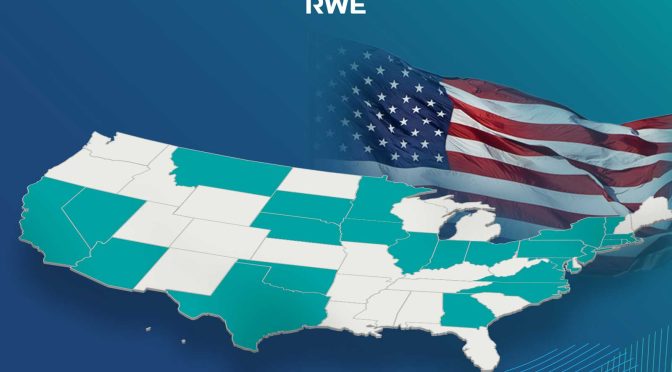
RWE Becomes a Top Tier Renewable Energy Company in the United States

Highest Self-Supported Wind Tower Ever Built

Renew Power Deploys India’s 1st 3X Platform Wind Turbine Generators

IMAGES
VIDEO
COMMENTS
The gold standard. The RYA Yachtmaster® Certificate of Competence is often the ultimate aim of aspiring skippers. It is a well known, highly respected qualification worldwide, proving your experience and competence as a skipper. Unlike other qualifications in the cruising programme, there is no formal training course to become an RYA Yachtmaster.
RYA Yachtmaster Offshore exam pre-requisites: Minimum seatime: Documented minimum sea time 1 completed on a seagoing sailing or motor yacht (as appropriate) in the last 10 years:. 50 days at sea on yachts up to 500gt 2 which may be reduced to 25 days if the candidate already holds an RYA Yachtmaster Offshore Certificate of Competence 3;; 5 days as skipper on vessels less than 24m LOA, which ...
A Yachtmaster qualification is a certificate of competence of the ability to handle either a sailing boat or motor boat (as endorsed) in certain prescribed conditions. Three different titles are specified; Yachtmaster Coastal (previously - and in some countries still - called Coastal Skipper), Yachtmaster Offshore, and Yachtmaster Ocean which ...
The gold standard. The RYA Yachtmaster® Certificate of Competence is often the ultimate aim of aspiring skippers. It is a well known, highly respected qualification worldwide, proving your experience and competence as a skipper. Unlike other qualifications in the cruising programme, there is no formal training course to become an RYA Yachtmaster.
RYA Yachtmaster Offshore Certificate. Students who pass their Yachtmaster Offshore practical and theory examinations will be awarded an RYA Yachtmaster offshore certificate of competency. It is important to understand that CoC is a recreational license until it is commercially endorsed by the MCA. RYA Yachtmaster Offshore Commerical Endorsement
The Royal Yachting Association Yachtmaster certificate has become the industry standard qualification after the entry-level stage. It is the first formal training in navigation and seamanship that deckhands receive on their path to higher MCA issued certificates and it is a vital part of their maritime education. If you are working towards your MCA OOW, Chief Mate or Master Certificate of ...
Yachtmaster Offshore Training. The IYT Worldwide Yachtmaster Offshore certificate is a recreational certificate of competency to command sailing and/or power vessels up to 24 metres in length up to 150 nm offshore. It is a comprehensive theory and live aboard course consisting of five days classroom theory and a practical component of six days ...
Despite this blessed lack of regulation, the Yachtmaster certificate remains the logical target of many a self-motivated sailor. It also represents the icing on the cake for those looking for the reassurance of an external assessment. Courses and exams. Yachtmaster training can take place on a boat or in a classroom.
RYA Yachtmaster Coastal Skipper : Not to be confused with the Coastal Skipper course completion certificate, the Yachtmaster Coastal is the first of the Yachtmaster Scheme qualifications. At this level you are deemed to have the knowledge needed to skipper a yacht on coastal cruises but not necessarily the experience needed to undertake longer ...
The RYA Yachtmaster Certificate of Competence is a much sought after qualification for skippers. This qualification is respected worldwide. One will be able to acquire the RYA Yachtmaster Certificate if they are able to demonstrate that they have sufficient sea-time, experience and certification in order to sit for an exam.
A commercially endorsed Yachtmaster Ocean Certificate of Competence will enable you to work worldwide as a Master of commercial vessels of up to 200gt. This Certificate of Competence can be used commercially in its own right. It is also a pre-requisite for the MCA's Chief Mate, Master 500 and Master 3000 qualifications. For more information ...
The RYA Yachtmaster Offshore Preparation Course teaches the skills and techniques required to skipper safely on offshore passages by day and by night, including passage planning, preparation for sea, pilotage, yacht handling under sail and power, as well as in adverse weather conditions and emergencies. The first five days of this seven-day ...
This includes the 3 independently examined levels of Yachtmaster Certificate of Competence, (coastal, offshore and ocean). RYA MCA Coastal Skipper & Yachtmaster Offshore Shorebased Course (Yachtmaster Offshore Shorebased for short). This is a 6 day course which includes three written papers. It is assumed knowledge for all of the certificates ...
The RYA Yachtmaster course is accredited by the RYA and MCA and recognized for service as Captain or Mate (OOW) up to 200gt up to 150 miles from a safe haven, at the Offshore level or up to 60 miles from safe haven at the Coastal level. The Yachtmaster CoC meets the STCW A-V1/1 and section A V1/1-4 when combined with Basic Training Courses.
A commercially endorsed Yachtmaster Ocean Certificate of Competence will enable you to work worldwide as a Master of commercial vessels of up to 200gt. This Certificate of Competence can be used commercially in its own right. It is also a prerequisite for the MCA's Chief Mate, Master 500 and Master 3000 qualifications.
There are 5 stepping stones to becoming an Ocean Yachtmaster CoC holder. Steps 1-4 can be taken in any order although the order presented below is the most logical. Step 5 can only be completed once the first 4 steps have been completed. Yachtmaster Offshore Certificate of Competence. RYA Ocean Yachtmaster Shorebased Course.
RYA Yachtmaster Offshore exam pre-requisites: Minimum seatime: Documented minimum sea time 1 completed on a seagoing sailing or motor yacht (as appropriate) in the last 10 years:. 50 days at sea on yachts up to 500gt 2 which may be reduced to 25 days if the candidate already holds an RYA Yachtmaster Offshore Certificate of Competence 3;; 5 days as skipper on vessels less than 24m LOA, which ...
The Royal Yachting Association Yachtmaster certificate has become the industry standard qualification after the entry-level stage. It is the first formal training in navigation and seamanship that deckhands receive on their path to higher MCA issued certificates and it is a vital part of their maritime education. This course equips you to navigate safely on coastal and offshore passages.
The RYA Yachtmaster® Coastal Certificate of Competence is proof that you have the knowledge needed to skipper a yacht on any coastal cruise. The holder of a Yachtmaster Coastal qualification should be competent to skipper a yacht of up to 24 metres LOA (up to 200gt) in waters up to 20 miles from a safe haven. Don't treat the examination just ...
The RYA Yachtmaster® Ocean Certificate of Competence is proof that you have the knowledge and experience needed to skipper a yacht on passages of any length in all parts of the world. The RYA Yachtmaster Ocean is the highest certification level at RYA. The holder of a Yachtmaster Ocean qualification should be competent to skipper a yacht of up ...
Welcome to Russia! We are Sergey and Simon, a Russian and a Frenchman, both passionate about Moscow, Saint-Petersburg and classic cars. Together, we have created Put-in tours. Our goal is to help you experience Russian culture off the beaten path. Join us onboard our classic Soviet van and let's get rolling!
Usain Bolt leaves it late but defends his 100m title at the 2013 World Championships in Moscow!#WorldChampionships #UsainBolt #Jamaica #IAAF #Athletics #Spri...
06 Nov 2020 by Rosatom. TVEL Fuel Company of Rosatom has started gradual localization of rare-earth magnets manufacturing for wind power plants generators. The first sets of magnets have been manufactured and shipped to the customer. In total, the contract between Elemash Magnit LLC (an enterprise of TVEL Fuel Company of Rosatom in Elektrostal ...